STEPS TO PROTECTINGYOURSELF













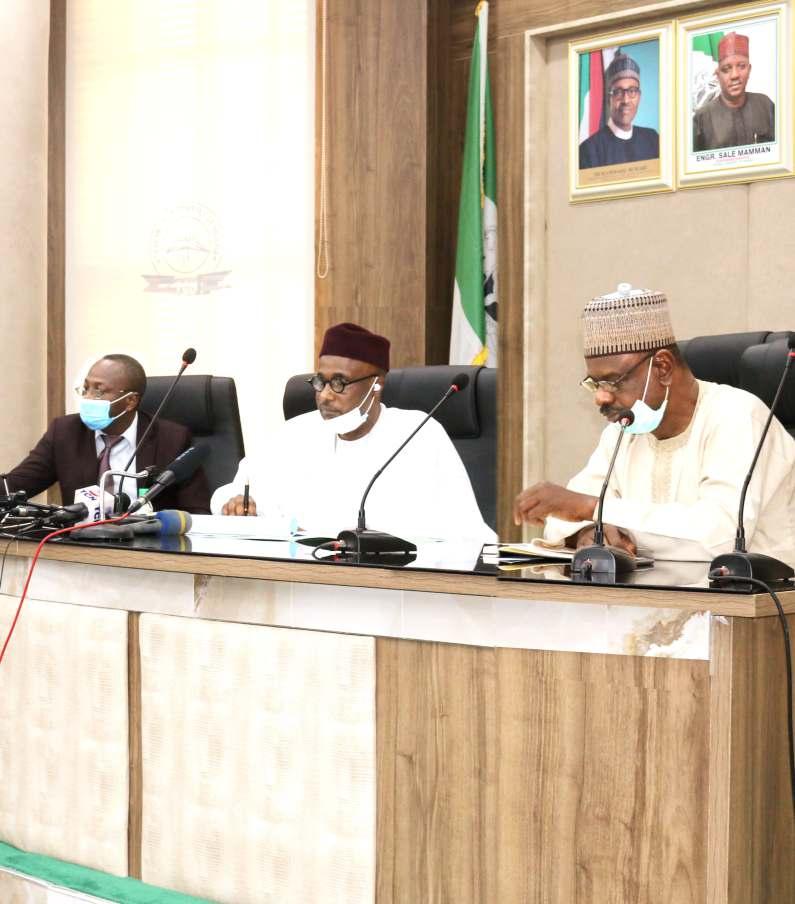


















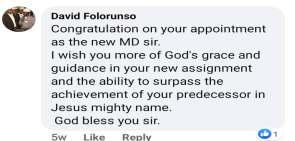

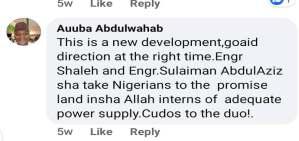

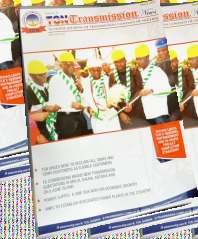

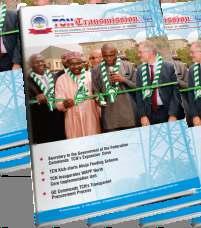

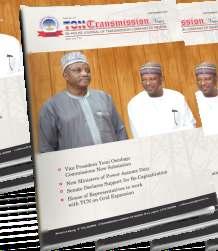

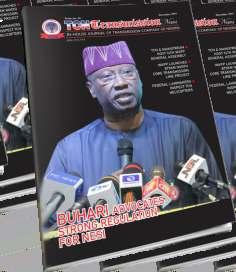
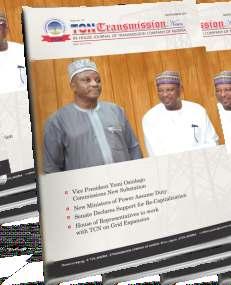

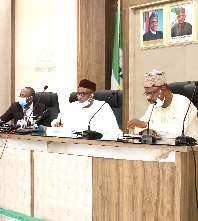
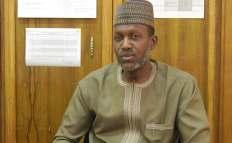
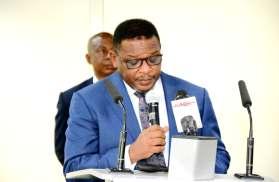
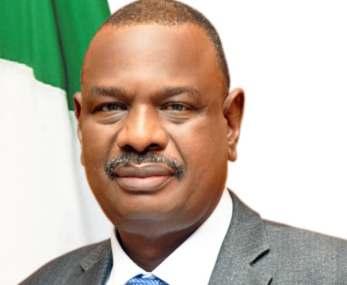
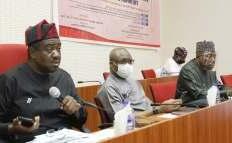
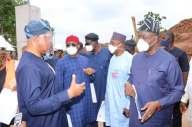
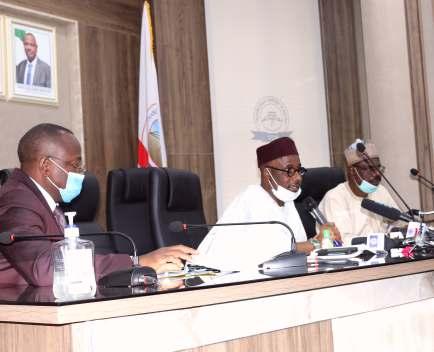
the contagious COVID-19 pandemic has affected every aspect of our lives one way or another, the work place is not exempt, business is no longer as usual as the global economy groans.
ICT facilitated mode of meeting such as webinar, zoom and conference calls have virtually taken over the traditional mode of meeting Number of persons attending internal or physical meetings are also restricted in compliance with the physical distancing rule. There are indications that even after COVID 19, the physical distancing and other Corona related rules would continue to affect our work place.
Designated as an essential service delivery company by the federal government of Nigeria, TCN worked through the peak of the pandemic period, and have had to adapt to new ways of getting its jobs executed without unduly exposing staff to the virus. The company equally provided safety items for staff, as indicated by the Nigeria Center for Disease Control (NCDC).
The pandemic notwithstanding, TCN continued to efficiently wheel all bulk power generated to the Disco load centers nationwide and has equally maintained a stable grid frequency within the period NCC announced a new maximum daily peak of 112,448.81MWH on April 17, 2020, clearly showing that the sector is active inspite of the pandemic With the wave of change came the appointment of a new Management team for TCN by the Federal thGovernment, announced on 19 May, 2020. This brought on board a new MD/CEO, Engr. S. A. Abdulaziz
and confirmed four Executive Directors who had been on acting capacity
With the new dawn in TCN and the atmosphere of great expectations, the new appointees have hit the ground running with various measures put in place to ensure staff are carried along in moving TCN to the next milestone. Within the period January to date, TCN had equally agreed to collaborate with Kwara, Jigawa and Ekiti State governments among others, to facilitate the achievement of transmission projects in their states.
TCN staff on the other hand have displayed commendable resilience and absolute commitment to work during the pandemic and have continued to implement projects using in house engineers, including restringing of lines, technical commissioning of completed projects among others.
Clearly TCN is not resting on its oars, but is striving to ensure the delivery of a robust transmission grid.
The on-going Abuja ring project comprising five new substations and 132kV transmission lines as well as the almost completed 132/33kV Gagarawa Substation in Jigawa State, recently inspected by the Hon. Minister and Ag. MD/CEO of TCN, and a host of on-going projects nationwide, testify to this.
Ndidi Mbah Editor-in-ChiefTo be one of the leading electricity transmission companies in the world To transmit electricity in the most efficient and effective manner
Whatever we do during this COVID-19 period, TCN enjoins you to stay safe !
Mrs Diiarau Didi Esther Walson-Jack holds a Bachelor of Laws degree from the University of Lagos, was called to the Bar in 1987. She also holds Certificates in Legislative Drafting from the Nigerian Institute of Advanced Legal Studies, Lagos, and the California State Senate, U.S.A Mrs. Walson-Jack is a Certified Conflict Resolution and Peace Building practitioner She started her career as a private legal practitioner and later joined the Public Service as a State Counsel in the Rivers State Ministry of Justice. On the creation of Bayelsa State out of the old Rivers State in 1996, Mrs. Didi Walson-Jack transferred her service to the Ministry of Justice, Bayelsa State, were she held dual positions of Solicitor-General of Bayelsa State and Permanent Secretary of the Ministry of Justice from July 2002.
In 2009, Mrs. Didi Walson-Jack transferred to the Federal Civil Service as Assistant Director at the Ministry of Niger Delta Affairs, and was later promoted to the post of a Deputy Director
In 2015, she was promoted to the position of Director and served in different capacities within the civil service before her appointment as the Permanent Secretary; Service Welfare Office (SWO), Office of the Head of the Civil Service of the Federation (OHCSF); rdMinistry of Niger Delta Affairs in August, 2019; and is currently serving in the Federal Ministry of Power since 23 December 2019.
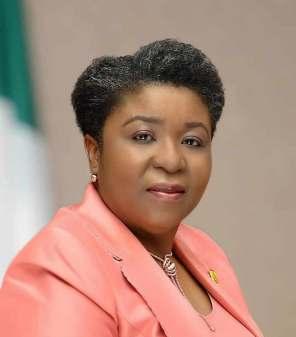
Mrs. Didi Walson-Jack is an alumnus of the prestigious National Institute for Policy and Strategic Studies (NIPSS), Kuru, member Nigerian Bar Association (NBA) and International Bar Association (IBA). She is also an award recipient of several renowned institutes and organizations.
Engr Sule Ahmed Abdulaziz is the new Ag MD/CEO of Transmission Company of Nigeria (TCN). He was the Regional Transmission Manager, Abuja Region of TCN before his appointment as the Acting Managing Director of TCN, on 19th May, 2020.
Engr. Abdulaziz joined the defunct National Electric Power Authority (NEPA) in 1996 as Manager, Electrical, and rose through the ranks to become the Senior Manager, Projects in the defunct Power Holding Company (PHCN) in charge of and supervising various project sites nationwide.
In 2013, Engr Abdulaziz was made the Assistant General Manager, Technical Audit in charge of valuation and vetting of all technical jobs executed by contractors among others. In 2014, he was moved back to Projects department as the Assistant General Manager, Substation Projects, working as projects director for all TCN's substation projects which includes general supervision, defining project parameters and ensuring compliance with specifications and timelines.
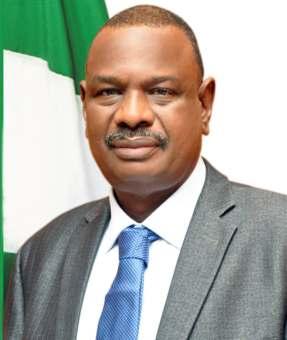
As Assistant General Manager, Projects, he ensured the successful completion and energizing of various transmission substation projects including Kukwaba in Abuja, Maiduguri Substation in Borno, Odogunyan Substation in Lagos State and Okpella Substation in Edo State, among others.
He holds a BSc Electrical and MSc Automation Engineering from The Technical University, Sofia, Bulgaria and is a member of the Nigerian Society of Engineers (NSE), Council for the Regulation of Engineering (COREN) and a Chartered Member of Nigeria Institute of Management (NIM). Engr Abudulaziz has attended several local and international Engineering, Technical and Administrative courses.
He assumed duty as the Acting MD on 20th May, 2020.
PERM. SEC. FEDERAL MINISTRY OF POWER MRS. DIDI ESTHER WALSON-JACK, mni
he new Management Team of the Transmission Company of Nigeria (TCN), comprising the Ag Managing Director and four
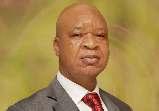
TExecutive Directors have received their letters of appointment from the President of the Federal Republic of Nigeria, Muhammadu Buhari.
The new Management Team which include Engr Sule A Abdulaziz as the Acting Managing Director, Engr Victor AdewumiExecutive Director (Transmission Service Provider), Engr Maman J Lawal - Executive Director (Independent System Operator), Mr Ahmad Dutse - Executive Director (Finance and Accounts) and Barr Justin Dodo - Executive Director (Human Resources and Corporate Services), have all been appointed for an initial term of four years.
The letters which were signed by the Secretary to the Government of the Federation, Boss Mustapha, noted that the appointment of the Acting MD is with effect from 19th May, 2020 while those of the four Executive Directors took effect from 27th December, 2019.
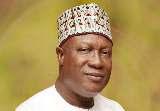
The Federal Government had on the 19th of May, 2020 announced the appointment of a new Acting Managing Director for TCN as well as the confirmation of the Executive Directors, who had been on acting capacity
Engr. Victor Adewumi is the Executive Director, Transmission Service Provider (TSP), one of the Business Units of TCN. Prior to his appointment, Engr Adewumi had covered the duties of the Head, Transmission Service Provider from September 2017. He was the General Manager (Maintenance & Field Ser vices), TCN Headquarters Abuja from 2015 to 2017, and was the General Manager (Transmission), Benin Region from 20122015.
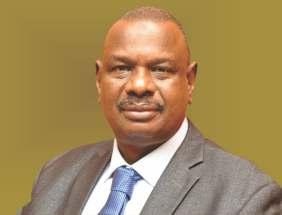
Engr. Adewumi holds a Higher National Diploma (HND) in Engineering from Ado Ekiti Polytechnic and has attended
many international conferences and seminars. He is a member of Council of Registered Engineers of Nigeria (COREN), Fellow, Institute of Corporate Administration of Nigeria, Member, Nigerian Society of Engineers (NSE) and Member, Nigerian Institute of Management (NIM). Engr Adewumi has served in many committees such as Task Force for Installation and Commissioning of 60MVA, 132/33kV Transformer at Irrua Sub-Station, Member Task Team for the Installation and Commissioning of 90MVA 330/132/13 8 Power Transformer in Osogbo Transmission Station and the National Control Centre, amongst others.
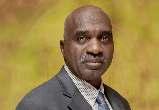
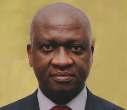
Engr. Maman Jimoh Lawal, is the Executive Director, Independent System Operator (ISO). Before his appointment, Engr Lawal covered duties as the Head Independent System Operations from September 2017. He Holds a B Sc Electrical Engineering from the University of IIorin, Kwara State, A Master of Science Degree (MSc) in Information Technology from NOUN.
Just before his appointment in September 2017, he was the General Manager, System Operations (SO). He has held several other positions in the past such as Trainer, (Power System P r o t e c t i o n & C o n t r o l , S C A D A / E M S N e t w o r k Administrator/Database), Manager (Power System Planning and System Operations).
Engr. Lawal has participated in several training programmes that are key in enhancing his knowledge and competencies in the power industry including: SCADA/EMS SOFTWARE
Engineering and Administration course in Essen Germany, Vienna, Austria SCADZ/EMS DATA Engineering course in Vasterasi, Sweden, Project Planning, Implementation Control and Intranet course in Montreal, Canada, Energy Management System course in Nurenberg, Germany, Transmission system Planning and Analysis course in Henectady, USA
From the knowledge he acquired through formal and on the job trainings, he designed a 2 year Rejuvenated Pupil Engineers' Development Program, comprising of Intensive Course Work & Field Experience Exercise for Engineers and Technologists. He was a member of the team that nurtured the Shiroro SCADA/EMS Application Software. On the regional level, he was part of the West Africa Power Pool (WAPP) Study Taskforce on Networks Interconnections. Engr Lawal is a corporate member of the Nigerian Society of Engineers (NSE), a registered Electrical Engineer with the Council for the Regulation of Engineering in Nigeria (COREN).
Mr Ahmed Isah - Dutse is the Executive Director (Finance & Accounts).
Prior to his appointment, he covered the duties of the ED (F&A) from 2017 to December 2019. From 2015 to 2017, he was the General Manager Treasury, Finance & Accounts Division of Transmission Service Provider (TSP) and Independent System Operation (ISO). Earlier, he was the GM Audit and Projects (Finance) from 2011- 2013. and the Assistant General Manager (Audit), Market Operations in 2009.
Mr Ahmed Isah - Dutse holds a Higher National Diploma (HND) in Accountancy, from Kaduna Polytechnic (Kadpoly), a Post Graduate Diploma in Accounting from the Nigerian College of Accountancy and MBA – Finance from Abubakar
Tafawa Balewa University, Bauchi.
He has attended many international conferences and seminars including “Modernizing Internal Control” Rech Management Centre, Dubai, UAE (2015), “Infrastructure Asset Management Workshop” Good Practice and Application, London, England (2012) amongst others.
Mr Ahmed is a member of the Governing Council, University of Jos, a Fellow Certified National Accountant (FCNA), Fellow, Chartered Institute of Taxation of Nigeria (FCIT) and member, Nigerian Institute of Management (NIM).
He has three publications to his name and has served in committees such as the 'Ministerial Task Force on Monitoring Major PHCN & NIPP Projects Performance.
Barr. Justin Ishaya Dodo is the Executive Director (Human Resource & Capacity Building
Before his new role as the substantive Executive Director Human Resources Barr Dodo has been covering duties of that office from January, 2019. Ealier, he had held the position of General Manger (Legal) ISO until his redeployment to the Human Resources Sub-sector as General Manager (Human Resources & Change Management) in August, 2018.
Barr Justin Ishaya Dodo has a Bachelor's Degree in Public Administration from Ahmadu Bello University, Zaria He also holds a Bachelor of Laws Degree (LLB, 1989) from the University of Lagos, and was called to the Nigerian Bar in 1990. He has attended several international and national conferences and seminars.
He is a member of the Nigerian Bar Association. He began his career as Assistant Manager (Personnel & Administration) in April, 1991 with the National Electric Power Authority
(NEPA). Between 2004 and 2006, he was the Senior Manager (Human Resources) in the Garki Business Unit and later in 2006 set up the Legal Department of the Abuja Distribution Zone (now Abuja Electricity Distribution Company). He was PM (Legal) in the Abuja Zonal office until October, 2010 when he took up appointment with the Transmission Company of Nigeria
He was Head of Secretariat of the Power Sector Reform Committee led by Rilwanu Lukman; member of Committee on TCN Legacy Debts and Liabilities set up by the Honorable Minister of Power, Works and Housing; member Committee on Review of the Electric Sector Power Reform Act, 2005 set up by the Honorable Minister of Power; member Committee to Review and Harmonize Industry wide Legal Documents; member West African Power Pool (WAPP) Committee on Review of Dark Fibre Agreement; member WAPP Committee on Review of Templates of Transmission Services Agreement (TSA) and Ancillary Services Agreement (ASA); and several other committees set up by TCN Management
he Chairman of the House Committee on Power,
THonourable Magaji Da'u Aliyu, has commended the operational performance of the Transmission Company of Nigeria (TCN), and pledged to support the company to further improve its operational performance.
Hon. Aliyu gave the commendation during the oversight visit with other members of the House Committee on Power to TCN th on Friday, 5 June 2020 at its corporate headquarters, Abuja
Honourable Aliyu noted that the oversight visit is part of the duties of the Committee on Power, as enshrined in section 88 of the Constitution of the Federal Republic of Nigeria. This, he noted, is to ensure that Nigerians are not shortchanged. He called on the Management of TCN to work with the Committee, stating that the primary goal of the committee is to ensure that things are done properly He commended TCN's performance so
far, saying that the company has done relatively well even though there is still room for improvement
“Our doors are open and we are here to ensure that things are done according to the law and within the law I assure you of our maximum support and cooperation," he said.
He congratulated the Acting Managing Director of TCN, Engr. Sule Ahmed Abdulaziz on his appointment and reiterated the committee's support to ensure the new management achieves its mandate.
While discussing issues of project implementation, the Committee urged the management of TCN to give due consideration to local content in projects execution in line with the President's Executive Order, and insisted that TCN should give preference to qualified Nigerian Engineers in the award of contracts. Giving preference to Nigerian Engineers will help the
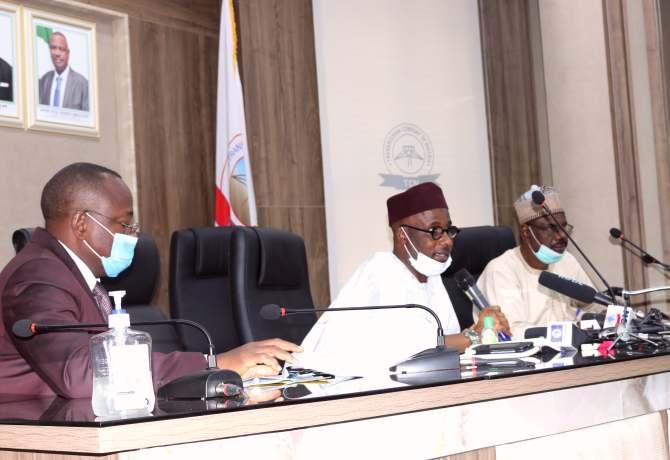
Earlier in his welcome address, the Acting Managing Director, Engr Sule A h m e d A b d u l a z i z e x p r e s s e d appreciation to the committee for the visit which he pointed out was the first official meeting with the committee on TCN premises in his new capacity as the acting MD
Speaking on experience garnered in TCN before his appointment, Engr. Abdulaziz noted that he has held several management positions in TCN and that a major part of his job was overseeing the execution of transmission lines and substation projects across the country. Prior to his appointment as the Acting MD/CEO, he was the Regional Transmission Manager of Abuja Region.
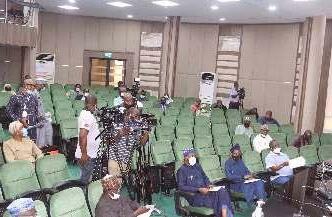
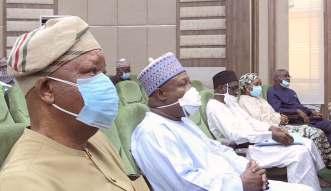
“Regular, proactive maintenance processes will be institutionalized to reduce the occurrence and impact of
breakdowns We will equally prioritize capacity expansion withnew projects that will span theentire nation”.
On achieving his mandate for TCN, the MD said that the journey to strengthening the transmission sector must start with transforming the existing system, with the government, regulator and TCN Management playing core roles. The government and regulator, he continued, takes the lead to create the right investment, whilst TCN focuses on implementing new technology, ensuring faster project execution and improving operational efficiencies.
He stated that "in order to drive growth in capacity utilization, the immediate focus of the new TCN Management would be replacing or repairing existing equipment, which are failing and prone to breakdowns. Regular, proactive maintenance processes will be institutionalized to reduce the occurrence and impact of breakdowns. “We will equally prioritize capacity expansion with new projects that will span the entire nation”
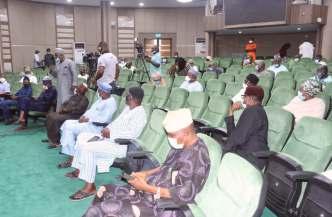
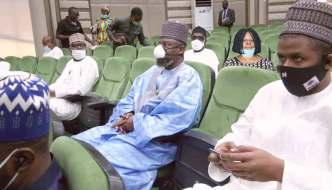 present administration achieve its mandate of reducing unemployment in Nigeria
present administration achieve its mandate of reducing unemployment in Nigeria
We will equally prioritize capacity expansion with new projects that will span the entire nationFront Row: Members House Committee on Power Members House Committee on Power (Front Row) and Management Staff of TCN ED (TSP), ED (ISO), ED (F&A), GM (Legal) ED (HR & CS) TCN TCN Staff during the courtesy visit
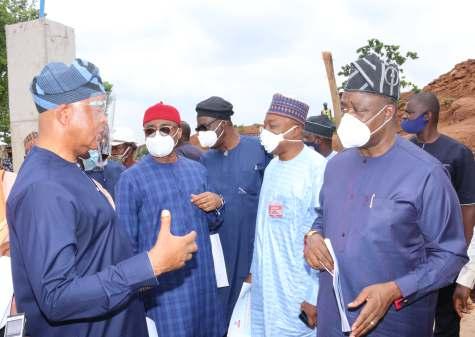
The Senate Committee on Power has commended TCN for various ongoing projects meant to enhance bulk power delivery to electricity consumers.
The Committee members led by its Chairman, Sen. Gabriel Suswam gave the commendation in Abuja, while on oversight inspection of TCN's ongoing 12.4KM Katampe-National Stadium 132kV double circuit transmission line and the New Apo 330/132/33kV transmission substation projects as part of its oversight function in the power sector.
Sen. Gabriel Suswam expressed delight at the level of work already accomplished by TCN and pledged their support in overcoming bottlenecks that may pose a challenge to the timely completion of the projects.
According to him, the essence of the oversight is to monitor and make sure that the committee is satisfied with what TCN is
By Bili Akaudoing, and to ensure a steady but seamless power delivery not only in Abuja but in the whole country” He expressed satisfaction that the completion timeline of the project would be actualized, particularly because it is a donor funded project
Commenting on the projects, the project supervisor, Engr Jane Okemini, explained that when completed, the project, would put the Federal Capital Territory on a ring at 132kV voltage level, thereby providing flexibility for bulk electricity service delivery in Abuja and environs The ring would make it possible for TCN to move from one line to another, if a problem occurs on any of the lines. At the end of the project, she said, Abuja would be on supply 24/7 hours.
The on-going Katampe-National Stadium 132kV DC line which originates from the 330/132/33kV Katampe Transmission Substation comprises 8.4KM of underground armored cabling that would terminate in Wuye District From Wuye, the line would be strung overhead on several towers for 4KM to the 132/33kV Kukwaba Transmission Substation.
The new 330/132/33kV Transmission Substation at new Apo, which is funded by the Agence Française de Développement (AFD) was designed to take additional electricity supply to the FCT from Lafia, Nasarawa State, and would provide electricity supply redundancy in Abuja and environs, consistent with N-1 criteria
The Minister of Power Engr Sale Mamman has inspected TCN's 2x60MVA 132/33kV Substation in Gagarawa, Jigawa State, to ascertain the progress of work in the substation.
The Minister who was accompanied on the inspection by the Executive Governor of Jigawa State, Alhaji Muhammad Abubakar Badaru, and the Ag. Managing Director and Chief Executive Officer of TCN, Engr. Sule Abdulaziz, on Saturday, th11 July 2020, said that the visit was part of effort to ensure that the project meets the completion timeline to improve the much needed additional bulk power delivery to Jigawa State and environs.
Addressing news men after the inspection of the site, Engr Mamman noted that the completion of the substation is in line with the Federal Government's effort to bring about incremental power supply to electricity consumers in the country.
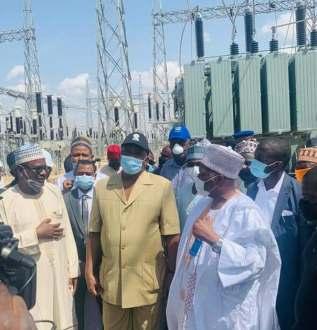
According to him, the completion of the substation would not only improve power supply but also boost socio-economic activities in the State He noted that several other transmission projects are on -going in different parts of the country as part of President Muhammadu Buhari's policy on power
Engr Mamman lamented the impact of the Coronavirus pandemic on the power sector and ordered all contractors to return to work now that the Federal Government has eased the lock down.
“I can tell you that the impact of the pandemic is huge in the power sector However, we are working in tandem with the Federal Government to restart the economy and since the interstate roads have been reopened, I direct all contractors handling power projects to return to their sites and work assiduously to make up for lost timelines caused by the
Corona pandemic” he said. He expressed satisfaction at the quality of work done at the Gagarawa Substation and noted that it will soon be ready for commissioning
Speaking, the Executive Governor of Jigawa State, Alhaji Muhammad Abubakar Badaru lauded the administration of President Muhammadu Buhari for its effort to bring about stable power supply in the state and the country at large. He noted that the new substation would massively increase revenue generation in the state through industrialization of several benefiting communities such as Gagarawa, Ringim, Gumel, Taura and Mira
It would be recalled that the contract for the 2 x 60 MVA, 132/33kV substation with a capacity of 96 MW and six outgoing 33kV feeders, was awarded in 2012 with an initial completion period of 24months. Work on the substation was stalled by the contractor until the Management of TCN recently reviewed the contract
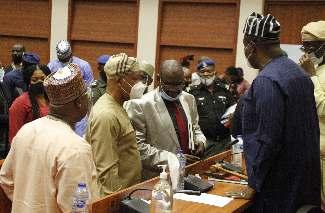 By Stella Ejikonye
By Stella Ejikonye
Understanding (MoU) has been signed between the governments of Germany and Nigeria, and that Siemens group are representing Germany
The management of TCN led by the Ag MD/CEO, Engr Sule A Abdulaziz, on their part, told the committee of TCN's capacity to wheel 8,100MW of electricity as at December 2018.
The Senate Committee on Power led by the Chairman, Senator Gabriel Suswan, have promised maximum support to finding a lasting solution to epileptic service delivery in the Nigerian Electricity Supply Industry (NESI).
This was made known at the investigative public hearing with the theme; “Power Sector Recovery Plan and the Impact of Covid'19 Pandemic” at the National Assembly Complex, Abuja
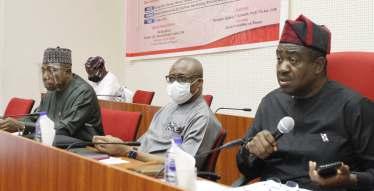
The essence of the public hearing, he noted, was to attempt to correct identified anomalies, find lasting solutions to them to boost power supply to Nigerians to at least 80% power delivery.
He said that the Federal Government has come up with strategies which if genuinely coordinated and implemented, will greatly improve the electricity sector and urged agencies and stakeholders in the industry to ensure proper synergy as well as assist the Honourable Minster of Power to achieve this administration's goal for the power sector
The Minister of Power, Engr. Sale Mamman, during his presentation disclosed that his major task on assumption of duty was to get all agencies of the ministry to synergize, having met lack of coordination within the system. He revealed that his major challenge was that heads of some agencies report and take directives from different ministers and leaders, thereby disorganizing the operations and activities of the sector
Speaking on the recent Siemen's involvement in the power sector, the Minister disclosed that it was part of the federal government's initiative to further strengthen TCN and Discos' infrastructure as well as address their commercial and technical challenges for better service delivery He informed the committee that a Memorandum of
He informed the committee of the progress achieved in the last two years. The Executive Director, Independent System Operations (ISO), Engr Maman Lawal gave specific details of efforts by TCN to establish its capacity through three different software simulations which he said is the standard way of accessing grid capacity The three simulations, he noted, gave the same result of 8,100MW as at December 2018.
The TCN Management assured the committee that TCN would further increase its capacity with the continued execution of its Transmission Rehabilitation and Expansion Program (TREP) aimed at further enhancing the grid network
Engr Maman Lawal said that grid load dispatch profile is a function of demand, and if the Discos are not able to off take power on the grid, the excess load on the grid network cannot be stored and that in such cases, there is nothing TCN can do, even though such incidents adversely affects the system. This, he noted, is very wrong and TCN frowns against load rejection by Discos and advice that Discos should be recapitalized to boost their capacity to take more load.
The TCN Management drew attention to insufficiency in gas supply and noted that this has been a major hindrance to power generation and consequently transmission and distribution of energy, and requested the committee's intervention in gas supply as well as the completion of ongoing hydro plants projects in the country
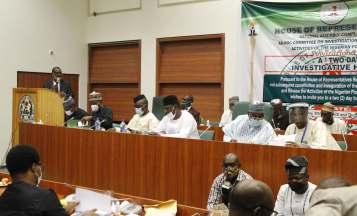
power transmission lines and substation projects which is often very expensive and slows down p r o j e c t s i m p l e m e n t a t i o n , sometimes for years. He urged the lawmakers to intervene.
The Ag MD/CEO listed core projects that TCN was seeking f u n d s t o a c c e l e r a t e t h e i r completion, saying that when completed, would substantially increase the quantum of power transmitted through the nation's grid.
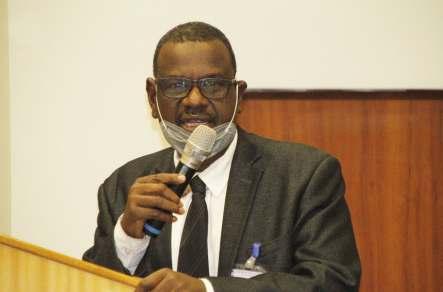
The House of Representatives, through its Ad-hoc Committee on Investigation and Review of Activities of the Nigerian Power Sector, recently conducted a public hearing geared towards finding solutions to the critical challenges that would enable improved access to electricity supply nationwide.
Speaking during the opening session, the Ad hoc Chairman and Majority Leader of the House, Hon. Ado Alhassan Doguwa said that the investigative hearing is a platform for the House of Representatives to gather adequate information that would guide it in providing appropriate legislative intervention in the power sector with a view to repositioning the sector for better service delivery
In his submission, the Acting Managing Director/CEO of TCN, Engr. Sule Abdulaziz explained the role TCN plays in the power sector and the challenges the company faces in executing power transmission projects across the country. He lamented the poor budgetary allocations which he said contributed to neglect of some critical projects.
Engr Abdulaziz informed that besides funding, TCN constantly encounters the challenges of Right of Way (RoW) and payment of compensation for
Commenting on the presentation by the Ag MD/CEO of TCN, the Ad-hoc Chairman said that the committee can only be guided to intervene in the challenges of the power sector with the right information from the power sector agencies. He lauded the operational performance of TCN and pledged his committees support in the area of improved budgetary allocations to cater for abandoned power projects.
Other heads of agencies that made presentations during the investigative hearing are the Chairman Nigerian Electricity Regulatory Commission (NERC), Nigerian Electricity Liability Management Company (NELMCO), Niger Delta Power Holding Company (NDPHC), Nigerian Bulk Electricity Trading (NBET) Plc, Ministry of Power, and Bureau of Public Enterprises (BPE) among others.
market would be able to fund and sustain itself with the activation of the Market Participant Agreement and Bank Guarantee (BG) as Payment Assurance.
He said, “the Escrow system which should have provided the much needed transparency in view of the fact that the collected revenue is a trust fund, was disorganized. The monthly invoice payment fell below 30% and the revenue gap in the Market continues to widen”
Indiscipline and non-compliance to the Market Rules and illiquidity in the sector have been identified as some of the reasons for the continued dependence of the Nigeria
Electricity Market on the government for intervention, despite the privatization of the sector since 2013.
The Market Operator, Engr Edmund Eje, made this known during a presentation at the public hearing titled “ Power Sector Recovering Plan and Impact of COVID -19 Pandemic”, organized rdby the Senate Committee on Power on Tuesday, 23 June 2020, at the National Assembly Complex, Abuja
Engr Eje noted that since 2013 when private investors took over the assets of the defunct Power Holding Company of Nigeria (PHCN) and signed Performance Agreements with respect to a number of key performance indices, the sector has not witnessed any improvement, rather, there has been a steady decline and trading of blames to the detriment of Nigerians and the economy.
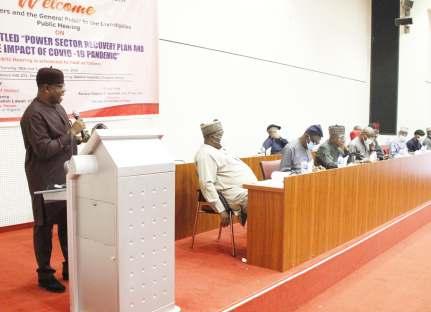
“The average performance of the market when the private investors took over in 2013 was 51%, but the 2019 average performance is 26% for energy/capacity invoice and 73.5% for Service Providers”, he said.
According to him, prior to the declaration of Transitional Electricity Market (TEM) in 2015, two pre-conditions that gave Market Participants (MP) including GENCOs, DISCOs and Service Providers very high level of confidence were that the
He posited that more stringent measures should be taken to rescue the market from collapse, such as strict compliance to the Market Rules by participants, granting of Cost Reflective Tariff to Discos based on performance, expulsion of any participant from the Market on account of poor performance, among others.
Meanwhile, stakeholders in the Power Sector have called for the immediate separation of Market Operator and Independent System Operation from Transmission Company of Nigeria (TCN) to enhance the transparency of the MO and to build confidence among Market Participants.
This position was made known by the Chairman of Nigerian Electricity Regulatory Commission (NERC), Professor James Momoh and representatives of Discos and Gencos during the hearing.
According to Engr Momoh, plans have been concluded to commence public hearing on the unbundling of TCN into Transmission Service Provider (TSP) and Independent System Operation (ISO) with a view to ensuring more independent administration of the Electricity Market devoid of bias.
In his closing remarks, the Chairman of the Senate Committee on Power, Senator Gabriel Suswam noted that the public hearing was an opportunity to galvanize stakeholders towards finding lasting solutions to Nigeria's electricity challenges, as well as align players in the value chain to achieve efficiency in the power sector Recommendations, he noted, would be forwarded to the executive arm of the government for consideration and implementation.
TThe government of Chad Republic has formally requested the Nigerian government to connect them to the Nigerian electricity grid in order to ease the burden of power supply in the country.
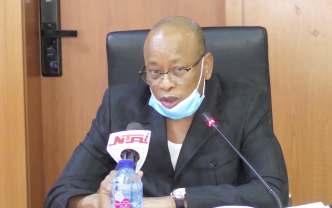
The Chadian Ambassador to Nigeria, Mr Abakar Saleh Chachaimi who made the request when he led a delegation on a working visit to the Nigeria Minister of Power, Engr Sale Mamman, recently in Abuja, said they were in Nigeria to discuss how to connect electricity from Nigeria through Maiduguri to Chad to enhance development
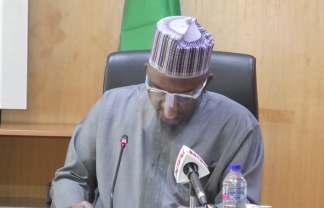
According to him, “The major problem of Chad is lack of power and the anticipated connection would be a life line. As you know, Nigeria is a key player in the sub-region and we request your due consideration in view of the historical relations between the two countries”
Describing the need as pressing, Ambassador Chachaimi stressed that the economic value of connecting Chad to Nigeria's electricity grid is a way of strengthening the existing collaboration between the countries He noted that Nigeria and Chad have had historical and economic relationship through Borno and the North of Chad, and that the request for electricity will further reinforce the relationship.
In his response, the Minister of Power, Engr Sale Mamman, assured the Chadian envoy that Nigeria will evaluate their request with the view to enhancing the long
existing relations between the two countries.
“The request from Chad Republic comes at the most appropriate time, and I want to assure you that we will evaluate and incorporate this request into projects we are already planning to execute under the Transmission Rehabilitation and Expansion Programme” he said.
For this to be properly done, TCN, he said, will have to come up with a business plan and implementation modality which would be communicated to the Presidency for necessary approval. With the abundant gas resources in Nigeria, and efforts by the present administration to strengthen the Power Sector as well as improve the ease of doing business in the country, Nigeria has the potential to generate and export electricity at very low cost to the sub-region, he said.
The Minister further informed the Chadian delegation that currently, Nigeria has bilateral contracts for supplying electricity to Niger Republic and Benin Republic which have been ongoing for decades and that under the West African Power Pool (WAPP), an 875 kilometres 330 kV power transmission line would be built under the North Core Transmission Line Project to interconnect four countries in the West African sub-region.
The meeting was also attended by the Minster of State, Power, Permanent Secretary, Federal Ministry of Power, TCN Ag. MD/CEO, Executive Directors of TCN and Directors from the Federal Ministry of Power
“The major problem of Chad is lack of power and the anticipated connection would be a live line.Minister of Power, Engr. Sale Mamman Ambassador Abakar S. Chachaimi
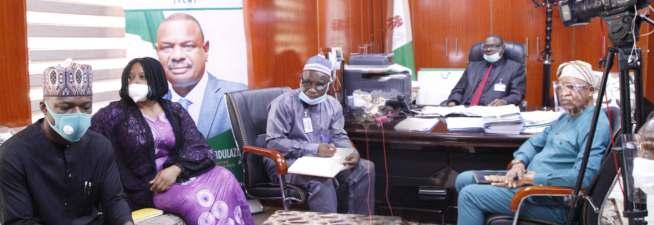 By Stella Ejikonye
By Stella Ejikonye
The new Management of the Transmission Company of Nigeria (TCN) led by the Ag MD/CEO, Engr Sule A Abdulaziz has met with the officials of the African Development Bank (AfDB) to discuss some critical challenges in financing as well as technical processes of power transmission projects with a view to accelerating their speedy execution.
Speaking at a virtual meeting held recently by the two parties, Engr. S. A. Abdulaziz assured the AfDB team of the full commitment of the new TCN Management towards delivering on the Nigerian Transmission and Expansion Project (NTEP 1), adding that he had headed several projects in TCN and was working out strategies with the Management team for accelerating the implementation NTEP-1 projects.
Engr. S. A. Abdulaziz assured the AfDB team of the full commitment of the new TCN management towards delivering on the Nigerian Transmission and Expansion Project (NTEP 1)
He further briefed the AfDB team about TCN's strategic plans so far. These, he said, include getting a consultant to design the quad conductor transmission upgrade project, and settlement of Project Affected Persons (PAPs) on the projects Right of Way (RoW), among others.
The AfDB Nigeria Country Representative, Ebrima Faal, on his part said that the forum provided opportunity to assess some ongoing projects in TCN. He discussed challenges facing AfDB/TCN projects, effectiveness of AfDB loan to TCN, approval for fund disbursement, subsidiary agreement, execution of project agreement with the banks, documentation of project agreement, Legal opinion from the Attorney General of the Federation, environmental/social safety and composition of the project team to kick start the project
Mr Faal said there was need for TCN to urgently work with the bank on the issues highlighted to expedite the funding of the project
The Director for Power Systems Development at AfDB, Engr Batchi Baldeh also congratulated the new acting Managing Director and CEO of TCN, saying he looked forward to having more robust working relationship with TCN especially on the NTEP-1 even as he indicated the banks interest in TCN's Eastern Back Bone project (NTEP 2).
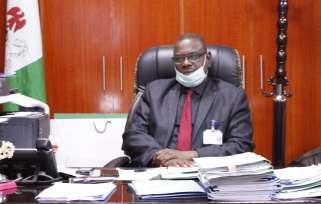
(RoW), to enable the timely execution of the 60km Double Circuit Akwanga Lafia 132/33kV transmission line in the state.
He informed the meeting that the Federal Executive Council (FEC) has approved the sum of N1.8billion for the construction of a 40 megawatts Hydro Power Plant by the Federal Ministry of Water Resources in the state and noted that the state government would want to partner with TCN to evacuate power that would be generated from t h e p l a n t w h e n c o m p l e t e d , f o r t h e industrialization of the state.
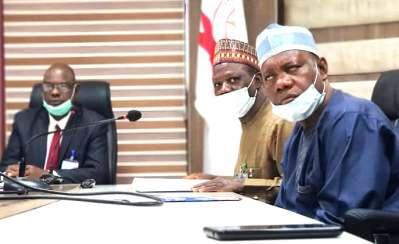
As part of efforts to strengthen the grid network and deliver bulk power to distribution networks in the country, the management of Transmission Company of Nigeria (TCN) has said that it would continue the execution of the 60km Double Circuit Akwanga – Lafia transmission line in Nasarawa State.
The Acting Managing Director and Chief Executive Officer of TCN, Engr Sule Abdullaziz made this known when he received a delegation from Nasarawa State government on a courtesy thvisit to TCN on Wednesday, 10 June, 2020, at its Corporate Headquarters, Abuja
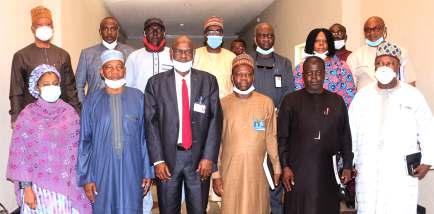
Speaking, the leader of the delegation and the General Manager, Nasarawa State Electric Power Agency (NAEPA), Engr. Abubakar Danjuma Ango, who represented the State Governor, said that they were in TCN to congratulate the acting MD/CEO of TCN, Engr. Abdullaziz on his appointment and solicit support for the completion of all ongoing transmission projects in the state.
Engr Ango who expressed confidence in the ability of the new management team to move TCN to the next level, disclosed that the state government was ready to collaborate with TCN and would pay compensation for the evacuation corridor required for the transmission Right of Way
Responding, the Acting MD/CEO, Engr Abdullaziz stated that despite the ongoing 330/132kV substation project being embarked upon by the Niger Delta Power Holding Company (NDPHC) in Lafia, the Nasarawa State capital, TCN would continue with the execution of the 132/33 kV transmission substation in the state.
According to him, the TCN management would look into the performance of the contractor handling the project with a view to expediting action towards its completion.
On the request by the Nasarawa State Government for the provision of a dedicated 33kV feeder to supply power to the three arms zone in Lafia, Engr Abdullaziz said TCN would be willing to enter into a contract agreement with the state, if the state meets all requirements stipulated by the Nigerian Electricity Regulatory Commission (NERC) under the Eligible Customer policy.
expressed appreciation to the agency for the continued support to TCN and assured that TCN will continue to synergize with them on capacity development
Lagos State has signed a power deal with USAID to improve electricity supply to millions of its residents and businesses within the state. The agreement will position the state to effectively launch the Lagos Integrated Resource Plan (IRP), under the Power Africa-Nigeria's Power Sector Programme initiative (PA-NPSP).
The Power Africa-Nigeria's Power Sector Program (PA-NPSP), under the auspices of the United States Agency for International Development (USAID) have pledged their commitment to support capacity building in Transmission Company of Nigeria (TCN) on Project Management and other training modules.
The Chief Party for PA-NPSP, Mrs. Mary Worzala made the pledge during a virtual meeting with the new Acting Managing Director and Chief Executive Officer of TCN, Engr Sule A Abdulaziz on thTuesday, 14 July 2020.
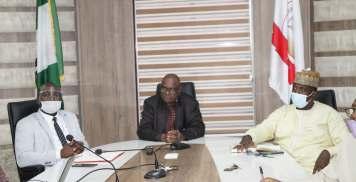
According to her, the agency was already working on a plan for project management training, and urged TCN management to liaise with their team on the training modules that would best fit the need of the company. She also assured that they would render the needed assistance to further strengthen the capacity of the company
The PA-NPSP, USAID team highlighted four key achievement of the agency in the nation’s power sector to include; Energy resources for private sector investment in gas supply, power generation, transmission and distribution. They also collaborate with World Bank, DFID and AfDB to fund projects and are looking forward to supporting the Federal Government of Nigeria and other stakeholders in ensuring power sector planning and coordination.
At the virtual signing of the letter of agreement between the state government and the United States' agency on Tuesday 14th July, 2020, the Governor, Babajide Sanwo-Olu, said there was no better place to start the journey towards improving access to electricity in sub-Saharan Africa than in Nigeria
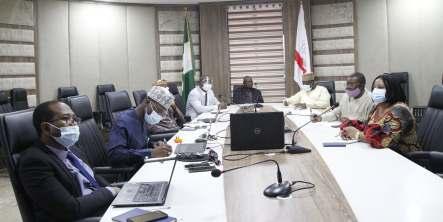
He noted that “the integrated resource plan is a priority initiative for Lagos State Government as it underpins our power reform strategy to ensure access to reliable and affordable electricity to residents becomes a reality”
The governor expressed gratitude for the PA-NPSP initiative and commended domestic stakeholders for their collective resolve to ensure that the Lagos IRP becomes a reality.
In his remarks, USAID's Mission Director, Mr. Stephen Haykin, said Power Africa recognizes the importance of reliable electricity supply to Nigeria's present and future development The Initiative, he said, will serve as a critical planning process to meet consumers' needs for electricity services in a way that satisfies multiple objectives.
Also speaking at the signing ceremony, Mr Tunde Gbajumo, Deputy Chief of Party for PA-NPSP, emphasized the importance of collaborating with relevant stakeholders such as gas suppliers, generation companies, Eko and Ikeja Distribution companies, the Transmission Company of Nigeria, Rural Electrification Agency and the Federal Government of Nigeria to develop sustainable solutions.
Participants at the ceremony include the Deputy Governor of Lagos State, Obafemi Hamzat; Permanent Secretary, Lagos State Ministry of Energy and Mineral Resources, Ahmed Mustapha; General Manager, Lagos State Electricity Board as well as key representatives from TCN, Rural Electrification Agency, Egbin Power Plc, Ikeja Electric, and Eko Electricity Distribution Company
The President of the Nigerian Society of E n g i n e e r s , E n g r B a b a g a n a Mohammed, FNSE, has commended the Federal Government for appointing Engr S A Abdulaziz as the new Ag Managing Director/Chief Executive Officer of the Transmission Company of Nigeria (TCN), saying that the appointment was the best thing the government has done for the NSE and the country at large.
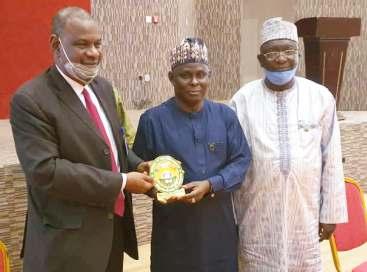
Engr Mohammed gave the commendation during a courtesy visit by the new Ag MD/CEO of TCN, Engr Sule Ahmed Abdulaziz, to his rdoffice on Thursday, 23 July, 2020.
The NSE President noted that the appointment was apt because the country is facing difficulties in the power sector and requires a professional in the field of engineering to find solutions to the issues which are engineering based, and that the NSE is happy with the appointment of Engr. Abdulaziz as the head of TCN. He thanked the Federal Government for the appointment and appealed to the government to equally look into other engineering based organizations with the view to ensuring that they are headed by qualified engineers. He enjoined the Ag MD/CEO TCN to do his best to live up to expectation and not fail the engineering community because his success or failure is the collective success or failure for the nation's engineers.
Engr Mohammed said that the NSE is always available to offer professional assistance and advice whenever it is called upon. He advised the new Ag MD/CEO to ensure that he fosters team spirit among his Management team so that the company can move forward. With proper synergy, he said, the team can achieve a lot
Also speaking during the visit, Engr. Ali A. Rabiu, the President, Council for the Regulation of Engineering in Nigeria (COREN), acknowledged that the country is facing very serious power challenge and prayed that the
Almighty would give the new Ag. MD/CEO of TCN the wisdom to lead TCN to a better future.
Responding, the Ag MD/CEO, Engr Abdulaziz expressed appreciation for the warm reception by the Presidents of NSE and COREN and promised to do his best to move TCN to the next level. According to him, “I have a team of engineers who are equally experienced in the power sector and I would continue to work with them to ensure we achieve our goal for TCN, in line with the plan of the present administration for the power sector” He stated that he would welcome constructive ideas and advice from the engineering bodies, saying that his team would work closely with NSE and COREN, listen to constructive criticisms even as TCN continues to work to ensure that it further expands and improves grid efficiency and reliability
The new MD/CEO noted that even though TCN has its challenges, he and his team are poised to do their best to ensure remarkable change in the system. According to him, “we know that there are problems but we would, by God's grace ensure that there is significant change in the nations grid moving forward” he said.
he Federal Government has reaffirmed its
Tcommitment to deliver 30GigaWatts of electricity to Nigerians with at least 30 percent of it from renewable energy sources by the year 2030 under its "vision 3030:30".
The Minister of State, Power, Mr. Goddy Jedy Agba, made this known during his address at the 11th International Conference on Energy, Power Systems Operation and Planning (ICEPSOP) Forum 2020 with the theme "Empowering Micro Grid with Smart Grid Attributes Development in United States and Africa” organised by the Nigerian Electricity Regulatory Commission (NERC).
Agba said he was pleased to note that the conference did not follow the usual path of finding faults and dwelling on the intractable problems of the power sector in Nigeria, but was aimed at generating home grown solutions to address the issues of accessible, reliable and affordable electricity to Nigerians.
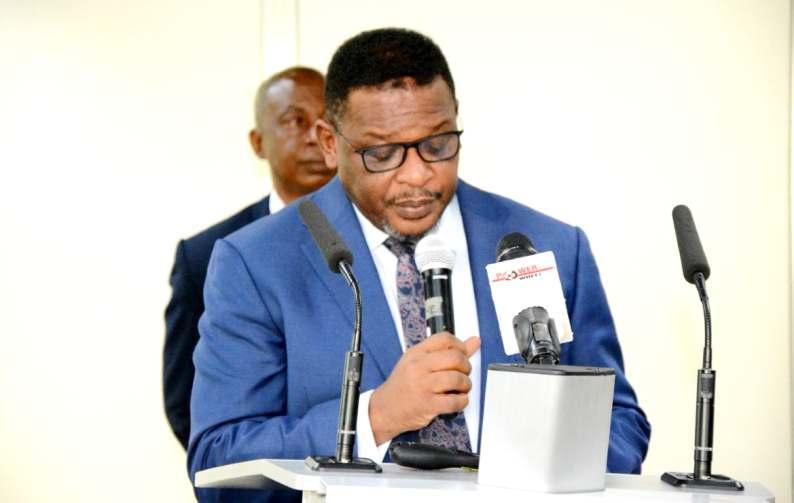
The Minister also stated that several educational institutions are making efforts to provide their own electricity through renewable energy sources, especially solar, citing as examples, Kano and Ife. This, he said, is a step in the right direction, and with the involvement of the younger generation, there is hope for a brighter future since home grown technological innovations are needed to address the challenges of the sector.
According to him, "metering gap in the Nigerian Electricity system has continued to be a major challenge to efficient service delivery. On-going research by local manufacturers to offer smart meters presents hope that lack of suitable meters in our network will be a thing of the past".
He commended the initiative of the National Agency for Science and Engineering Infrastructure (NASEI) for mass producing smart meters for electricity consumers in the country
Mr Agba further urged NERC to ensure that decisions reached at the conference are implemented accordingly
The Chairman, Nigerian Electricity Regulatory Commission (NERC) and host of the conference, Professor James A Momoh, in his welcome address earlier, identified the concerns of Nigerians to include access to energy, availability, reliability and quality of supply, lack of meters, system losses, infrastructure misalignment and affordability of costreflective tariffs.
According to him, "the conference will provide the required atmosphere to explore innovative regulatory approaches in promoting efficient and competitive service delivery involving deployment of smart and micro - grid technologies, access to adequate power, cost reflective tariffs, automation of review processes and enhancement in data analytics".
Prof. Momoh added that the conference would also provide new markets of willing buyer, willing seller models, franchising, embedded generation, Mini-grids, Flexible and Secure Energy Sources as well as redesigned network structure comprising hybrid of networks, smart grid technology and distributed generation capabilities.
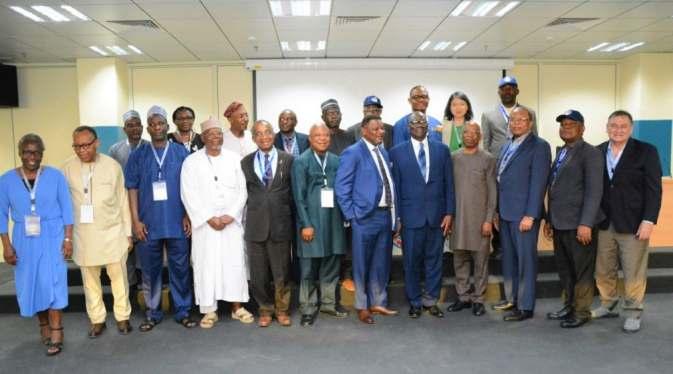
The former Managing Director/CEO of the Transmission Company of Nigeria, Mr Usman Gur Mohammed, who chaired the concluding session of the conference, explained that TCN was working towards integrating solar power with a grant from the European Union, and plans to construct a
the conference will provide the required atmosphere to explore innovative regulatory approaches in promoting efficient and competitive service delivery involving deployment of smart and micro - grid technologies, access to adequate power, cost reflective tariffs, automation of review processes and enhancement in data analytics
330kv transmission line from Katsina to Guiwa through Daura, Kura and Jogana for the evacuation of solar energy from Guiwa Independent Power Plant (IPP).
He also advised that the procurement method used for the current 14 solar power generation companies be changed to competitive procurement model so that Nigeria would be able to attract reasonable pricing which can be much less than the present charge of 7.5 cents per kilowatt hour
The conference had experts and scholars from different parts of the country and the United States including Dr Robin Podmore, IEEE Smart Village, USA, Moses Garuba, Associate Dean, College of Engineering and Architecture (CEA), Howard University and Prof Ali Mehrizi-Sani, Virginia Polytechnic Institute and State University (Virginia Tech), VA, USA
CN has made a case at NERC's public hearing for the
TReview of Ancillary Service Tariff from the present rate of N0.056/Kwh to N0.75/Kwh, to enable procurement of 260MW Secondary Reserve including black start events for grid security, stability and reliability in the Nigerian Electricity Supply Industry (NESI).
The Market Operator, Engr Edmund Eje justified the need for the review of ancillary services tariff during a presentation on behalf of TCN at the Public Hearing on the Review of Extraordinary Tariff for Electricity organized by NERC, on Monday, 16th March 2020, at NERC headquarters, Abuja
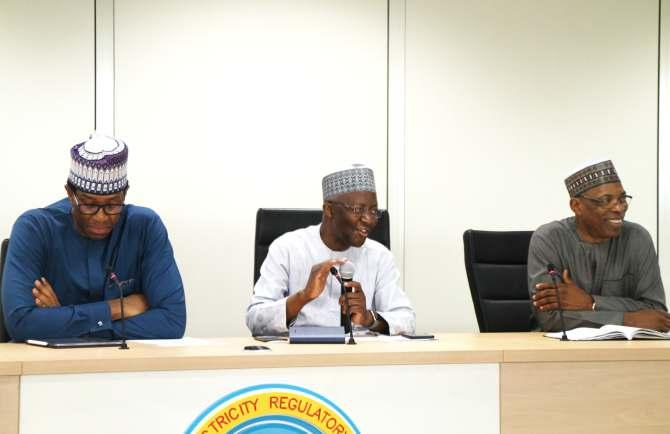
Engr Eje, stated that the provision of adequate Ancillary Service will enable Nigeria Electricity Market (NEM) achieve system security, safety and reliability, reduce the risk of system collapse, make restoration of supply easy and at the same time mitigate damages to the generation turbine blades. He further mentioned other benefits like: reduction in outage hours for distribution, transmission and generating equipment, ensuring the integrity of NEM, ensuring that the Discos serve their customers more reliably, as well as enhance the market
liquidity and power quality. According to him, in line with the Grid Code, it is the role of the System Operator (SO) to control the grid. The SO is mandated to harmonize, coordinate and optimize effective operation of the grid to maintain stability, safety and reliability even as it carries out security constrained economic dispatch.
He explained that ancillary services employed by the System Operator to smoothen grid operation include: Voltage Regulation, Black Start and Operating Reserve which comprise the Primary and Secondary Reserves.
Engr Eje noted that the Primary Reserve is represented by the Free Governor Mode of Operation which is mandatory for all generators connected to the grid. It is a Grid Code compliance requirement that all on-grid generators provide the Primary Reserve by synchronizing with the automatic load ramp down according to their capacities. The Primary Reserve, he said, is not paid for unlike the Secondary Reserve.
He further explained that the Secondary Reserve, which is the Spinning Reserve, comes into play when Power Demand is
(L-R) NERC Commissioner Legal, Licencing and Compliance Mr Dafe Akpeneye, Chairman of the Panel and Vice Chairman of NERC, Engr. Sanusi Garba and Commissioner for Consumer Affairs, Dr Moses Arigo during the public hearing in Abuja.higher than supply during contingency situations. It is a supply that is paid for by the market Any generator with the capability is engaged through a Spinning Reserve Purchase Agreement
He noted that the system has largely achieved Primary Reserve through the enforcement of Free Governor Mode of Operation, and stated that the absence of Spinning Reserve or the Secondary Reserve was responsible for the unabated frequency roaming and instability being experienced in the system.
In further advancing the justification for the review, Engr Eje, said that the only ancillary service presently being paid for by the Market Operator was the Black – Start since 2015.
Engr. Eje said further that if approved by the Regulator, the provision of the procured Spinning Reserve would be reviewed every six months, taking into consideration the progress it has made in power grid stability.
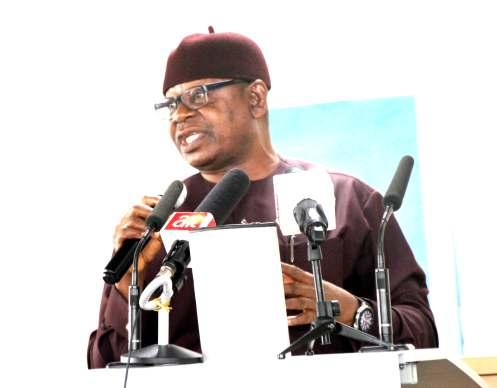
Speaking also in support of the review for Ancillary Service, the former Managing Director and Chief Executive Officer of TCN, Mr Usman Gur Mohammed said the request for the provision of Spinning Reserve on the national power grid was to complement the Primary Reserve for an improved system stability
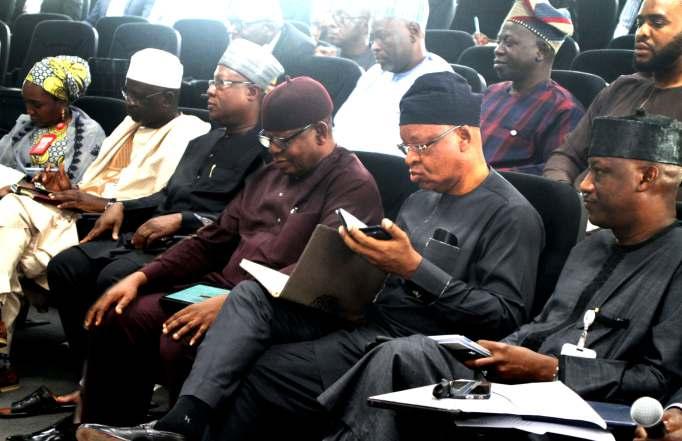
He assured stakeholders that TCN will adequately deploy the Spinning Reserve for the overall success of the Nigerian electricity grid as soon as NERC grants approval. Generating companies, he noted, have not been willing to provide this service because the task was not incentivised.
The Chairman of the three-man Tariff Review Panel and the Vice Chairman of NERC, Engineer Sanusi Garba said the hearing was to allow stakeholders understand the justification for providing the Spinning Reserve and noted that the Commission will quickly make decision on the presentation.
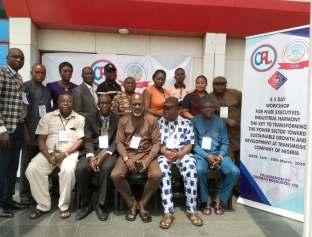 By Stella Ejikonye
By Stella Ejikonye
TNational Union of Electricity Employees (NUEE) paid a familiarization visit to the new Acting Managing Director/CEO of TCN, Engr S A Abdulaziz and his management team.
he representatives of the National Executives of the

years as officer in charge of projects, nothing is new I understand the workings of TCN, appreciate the Union as well as staff yearnings”
According to him, staff welfare remains one of his topmost priorities and promised to do his best to ensure that he and his team leave a legacy by the end of their tenure.
Speaking on behalf of the delegation, Comrade Wisdom Nwachukwu stated that it has been a tradition for the TCN inhouse unions to felicitate with any new Management to ensure cordial working relationship and also secure a friendly atmosphere especially as regards staff welfare.
According to him, the visit affords the union opportunity to discuss some pending issues on staff welfare and also forge a way forward to further advancing TCN. He informed that they came in peace to express solidarity and assured the management of their total support as long as the management adheres to agreements.
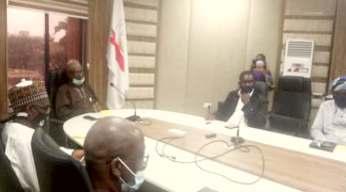
In his remarks, the Acting MD/CEO, Engr Sule Abdulaziz appreciated the union executives for the visit, and promised to work with them while soliciting for more cooperation as well as peaceful working environment as his administration's strategic plan unfolds. He said “As an old staff who grew up in the system and has served the organization for over twenty
He revealed that he will re-introduce the original TCN organogram to enable staff promotion as events unfolds and disclosed his willingness to advance TCN's wheeling capacity for better service delivery to Nigerians.
Speaking at the meeting, the Executive Director (Finance & Account), Mr Ahmed Isah Dutse, told the union executives not to entertain fear on the operations of the newly appointed Management team, emphasizing that staff welfare will not be undermined.
Speaking also, the Executive Director (Human Resources & Corporate Services) Mr Justin Dodo, advocated for peace and maximum support as enjoyed by the previous administration. He urged the NUEE executives to seek for peaceful resolutions to misunderstandings and assured them of good working relationship.
TElectricity Workers and Allied Companies have pledged her support and solidarity to the new Ag MD/CEO of TCN and his Management team, while urging that they take TCN to the next level regarding operational efficiency and staff welfare.
he TCN Branch of Senior Staff Association of
visit, noting that he is a union-friendly person, and promised to work harmoniously with the labour
The SSAEC branch Executives led by its Branch President, Comrade Bidemi Dairo, made this known during a courtesy visit to the new Ag MD/CEO of TCN, Engr Sule Abdulaziz in his office recently
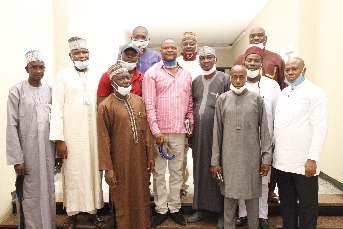
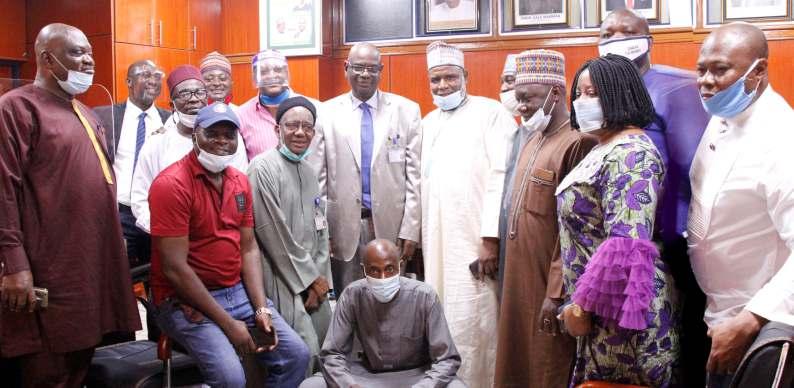
Engr Dairo noted that the focus of the union is on promoting peace and harmony in TCN with particular emphasis on staff welfare, and urged the Ag. MD/CEO to pay closer attention to improving the well-being of TCN staff
According to him, the new Ag MD/CEO has been part of the TCN family and expectedly, it would be easier for him to leverage on that to attend to areas that need improvement in the system because he knows the system better as an insider, being one of us. He assured that the Union will also give due attention to their primary assignments as staff of TCN, first before any other secondary assignment, for improved productivity in the company.
Responding, Engr Abdulaziz expressed appreciation for their
The Ag MD/CEO who was appreciative, promised not to withhold from staff, their benefit, promotions and prompt payment of salary, but however sued for peaceful coexistence between the two in-house unions for enhanced productivity, saying that his doors are open for constructive and productive inputs that would move the company forward.
He enjoined SSEAC TCN Branch and National to come together in unity so as to bring about peaceful co-existence in the company There is need for unity.
Ag. MD/CEO, TCN, Engr. Sule Abdulaziz in a group picture with Executives of SEAEC TCN branch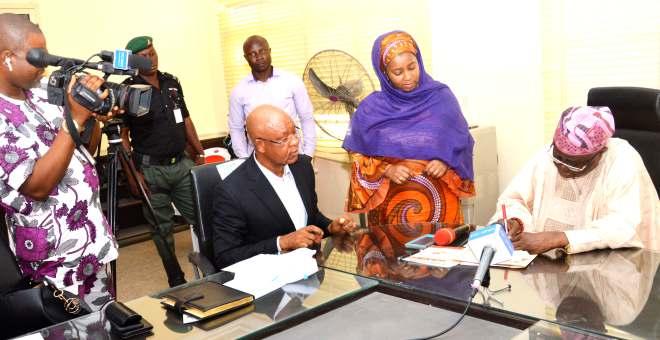
he Transmission Company of Nigeria (TCN) has
Tsigned a Memorandum of Understanding (MoU) with the Government of Ekiti State on the construction of the Ado Ekiti – Ilupeju and Ado Ekiti – Ijesha Ishu 132kV transmission line and associated 2x60MVA 132/33kV substations at Ilupeju and Ijesha Ishu within the state. The MoU was signed on Tuesday, 25th February, 2020, in the office of the Deputy Governor of Ekiti State.
The state governor, Dr Kayode Fayemi, represented by his deputy, Otumba Bisi Egbeyemi, expressed delight that the MoU would result in new transmission lines as well as two new substations that would help ameliorate the poor electricity supply situation in the state. He stated that presently, the state has only one number 132kV transmission substation which is very inadequate for the state and expressed optimism that the projects when completed, would provide conducive environment for industrial development in Ekiti State.
He noted that his administration was deeply concerned about improving infrastructural projects, to help the citizens attain
economic stability and ultimately revolutionize the state. He therefore urged TCN to look at the place of Ekiti State in its network with the view to improving TCN's presence and boosting bulk supply to the state, to enable the government achieve its five-cardinal program for its citizens.
The deputy governor assured that the state would create an enabling environment for TCN to effectively complete the project, noting that the people of the state have lost confidence in the power sector and that there is need for TCN to help rebuild confidence again. He called on other stakeholders in the power sector to endeavor to upgrade their facilities and urged that they also develop synergy among themselves to enable them ultimately provide better service to electricity consumers in the state.
Earlier, while welcoming the TCN team to Ekiti State, the Commissioner for Public Utilities, Hon. Dele Fagbanusi said that the MoU signifies physical attempt to reduce the perpetual low power voltage and positively impact economic activities in the lives of the 82,300 electricity consumers within the 134 communities in the 16 Local Government Areas of the state.
(Right), Ekiti State Deputy Governor, signing the MoU on behalf of his State while Otumba Bisi Egbeyemi, ED (TSP), Engr Victor Adewumi and GM Legal Mrs Fatima Muhtar look onAccording to him, the signing of the MoU is a result of the Governor's commitment to finding solution to the poor power situation in the state. The state, he explained, would take care of Right of Way for the transmission lines and provide land for the two substations while TCN would procure all equipment, install and commission the projects. He appealed to TCN to complete the projects on time.
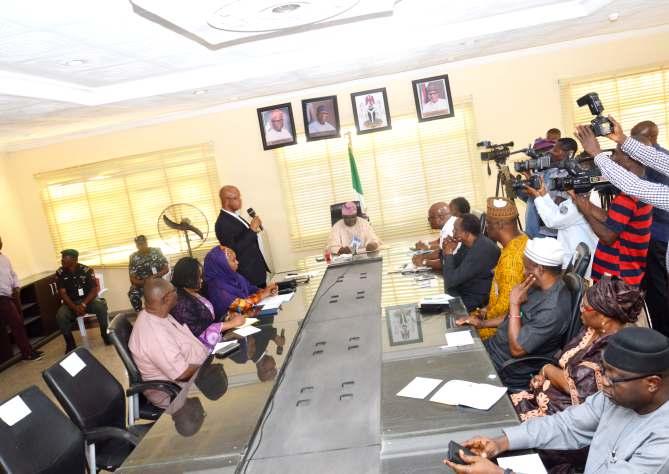
Speaking, the Head TSP TCN, Engr Victor Adewumi said that TCN would kick start the 132kV double circuit lines and the two substations projects at Ilupeju and Ijesha Ishu simultaneously
He acknowledged that the singular 132kV transmission substation in the state was grossly inadequate, which is why TCN is collaborating with the state government to construct the two transmission lines and two substations. On completion of these projects, the voltage profile of electricity in the state would normalize. He noted that the collaboration with the state would ensure faster delivery of the projects which he said can be completed by the end of the second quarter of 2021.
The MoU specifically put the responsibility of providing the Right of Way (RoW) for the transmission project and the
provision of land for the two substation projects on the Government of Ekiti State, while TCN would be responsible for procuring the equipment, all engineering works/installation and commissioning of the substations and lines.
With the execution of the MoU between TCN and Ekiti government, TCN would now commence processes leading to contract award and execution.
TCN Management and officials from Ekiti State Government during the occasionHe acknowledged that the singular 132kV transmission substation in the state was grossly inadequate, which is why TCN is collaborating with the state government to construct the two transmission lines and two substations.
he Director of the North Core Project, one of
Tthe priority projects of the West African Power Pool (WAPP), Engr. Mailele Djibril, in this interview, speaks on the implementation process so far and how the project will connect Nigeria and three countries up to the Republic of Burkina Faso with critical transmission infrastructure to enhance regional electricity trade. Excerpts;
NORTH CORE PROJECT IS ONE OF THE PRIORITY CORE PROJECTS OF WAPP INVESTMENT MASTER PLAN, WHAT DOES IT AIM TO ACHIEVE?
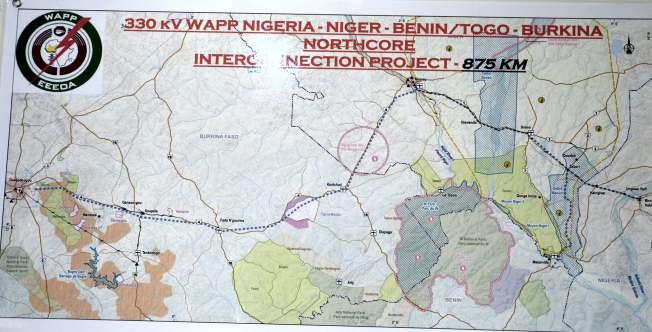
The ECOWAS member countries, through the West African Power Pool (WAPP) are setting up a large electricity market to allow reliable and affordable electricity supply to citizens. This however needs infrastructures that was captured inside a unified investment Master Plan comprising:
- Electricity generation facilities where affordable
- Transmission facilities (lines and substations) to interconnect Grids/Networks and allow energy exhange
- IT platform for Energy Trading being implemented at Cotonou (WAPP-ICC)
In the framework of interconnecting Grids, many projects were identified to be priority projects since they should allow energy
to be traded among ECOWAS member countries:
- COASTAL BACKBONE (Cote d'Ivoire Ghana Benin/Togo – Nigeria)
- INTERZONAL HUB (Ghana – Burkina Faso – Mali)
- OMVG – OMVS (Guinea – Guinea Bissau- Gambia – Senegal - Mali – Mauritania)
- CLSG (Cote d'Ivoire – Liberia – Siera Leone – Guinea) NORTH CORE (Nigeria- Niger – Benin/Togo – Burkina Faso) is the last link that should allow the minimum required interconnectivity to exchange energy among West Africa Countries.
The infrastructure mainly comprises 875km of 330kV double circuit transmission lines from Birnin Kebbi (Nigeria) all the way to Ouagadougou (Burkina Faso) through Zabori (Niger) and Gorou Banda (Niger) and from Zabori (Niger) to Malanville (Benin). In addition, we have 24km of 225kV transmission lines in Burkina Faso to loop the grid inside Ouagadougou town. Five substations (Zabori and Gorou Banda in Niger, Ouaga East and Ouaga South-East in Burkina Faso, Malanville in Benin) are involved in that project as well and some additional SCADA and SVC's. So, in Nigeria we have 62km, in Niger we have 420km, in Burkina Faso we have 381km and in
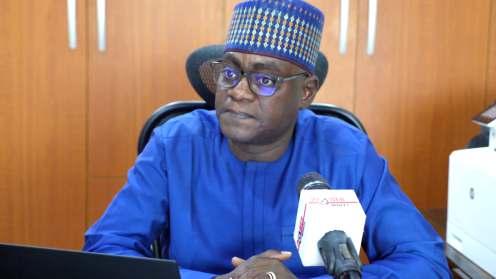
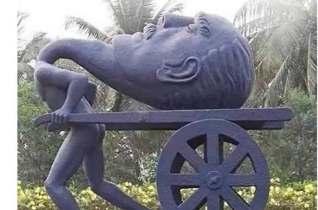
 Director, (North Core Project), Engr. Mailele Djbril
Director, (North Core Project), Engr. Mailele Djbril
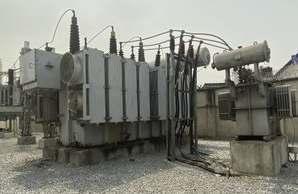
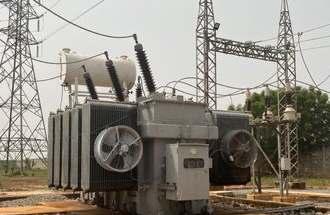
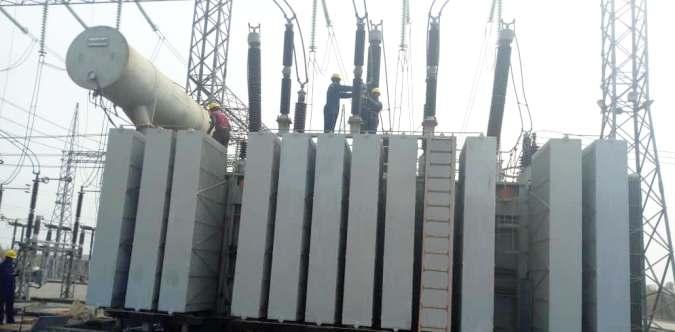
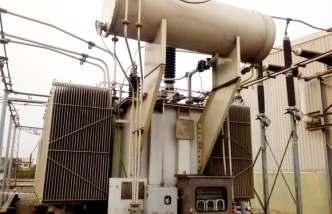
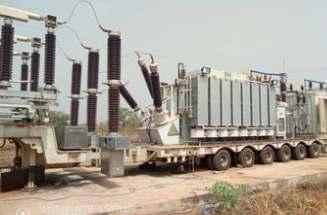 45MVA 132/33kV power transformer in Apapa 132/33kV Transmission Substation, Lagos State
30MVA Power Transformer in Egbin Transmission Substation, Lagos State
40MVA mobile transformer in New Etsako Transmission Substation, Delta State
45MVA 132/33kV power transformer in Apapa 132/33kV Transmission Substation, Lagos State
30MVA Power Transformer in Egbin Transmission Substation, Lagos State
40MVA mobile transformer in New Etsako Transmission Substation, Delta State
CN engineers have installed nine power transformers
Tthis year The transformers, which vary in capacity from 30MW to 300MW, were installed by TCN engineers and have all been connected to the national grid. The transformers include the following:
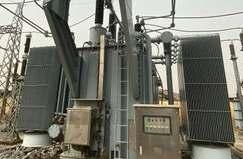
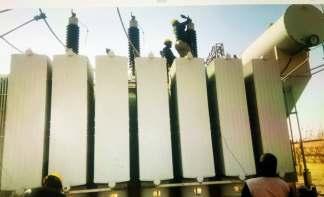
On January 7th, 2020, a new 100MVA 132/33kV power transformer was energized in Ogba Transmission Substation, Lagos State. The newly energized transformer which was installed under supervision of TCN engineers has increased the capacity of the substation from 165MVA to 265MVA
Prior to the installation of the 100MVA power transformer, Ogba Substation had a total of two (2) units of 60MVA 132/33kV power transformers and one (1) unit of 45MVA 132/33kV mobile power transformer. To ensure optimal utilization of the newly installed power transformer, a brand new switchyard made up of 132kV, 33kV and three (3) number 33kV feeder bays was equally installed and commissioned.
The increase in the substation's capacity, from 165MVA to 265MVA, means that the substation has more bulk electricity available for Ikeja Disco to take to its customers within Ikeja Industrial Area, and environs.
To optimize the capacity of the newly commissioned 100MVA at Ogba and other substations feeding Ikeja Distribution Company, TCN has already imported high capacity conductors and would soon conclude on reconductoring contract that will expand capacity of the transmission lines supplying the substation. This will substantially increase the current capacity of the lines.
On the 9th of January, 2020, TCN energized a newly installed
40MVA, 132/33kV mobile power transformer in the new Estako Transmission Substation.
The 40MVA 132/33kV mobile transformer was completed through collaboration between TCN and Edo State Government, where the State Government built the control room while TCN's in-house engineers installed other substation equipment and commissioned the substation The new substation provides relief to existing Irrua Substation in the state, as some areas previously served by Irrua would now take supply from the new Etsako Substation.
With the new 40MVA Etsako substation, TCN now has increased transformer capacity which translates to increased bulk power for the Benin Electricity Distribution Company's to take to customers within its franchise area
On the 10th of January, 2020, for the first time, TCN energized a 300MVA 330/132/33kV capacity power transformer installed by TCN in-house engineers.
The new Asaba 300MVA 330/132/33kV capacity power transformer replaced a decommissioned 150MVA 330/132/33kV Siemens brand transformer, commissioned by NIPP on the 15th of February, 2015.
On 27th January 2020, TCN commissioned another 60MVA at the Aja 132/33kV transmission Substation, Lagos State. Before the installation and commission of the new power transformer, the transformer capacity of the substation was 220MVA, this has now increased to 280MVA
The transformer which was installed by TCN contractor has increased the capacity of the substation by 48MW increasing available bulk electricity for Eko Distribution Company to take to its customers in Aja and environs
60MVA 132/33kV power transformer in Gusau Transmission Substation, Zamfara State 100MVA 132/33kV power transformer in Ogba Transmission Substation, Lagos StateBefore the newly energized 300MVA power transformer was installed, TCN temporarily fed the Asaba Transmission Substation through the Onitsha-Asaba 330kV transmission line connected to the Onitsha - GCM 132/33kV transmission line. This restricted maximum load transmission on Onitisha – Asaba transmission line.
With the commissioning of the new 300MVA power transformer, TCN now has available 240MW bulk electricity available in Asaba TS, that would enable Benin Electricity Distribution Company (BEDC) distribute more stable electricity to its customers in Asaba Metropolis and environs.
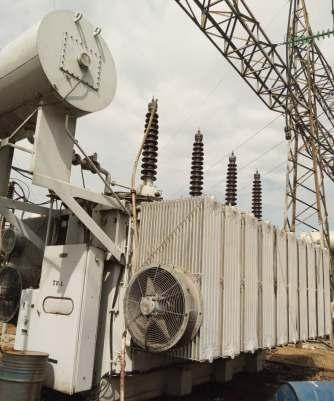
On the 23rd of January 2020, a 45/60MVA power transformer was commissioned in TCN's Gusau Transmission Substation, Zamfara State. This upgraded the substation's capacity from 60MVA to 120MVA The new transformer was installed by TCN engineers and has increased bulk supply to Kaduna Electricity Distribution Company for consumers supplied from Gusau Substation.
Also, on the 23rd of January 2020, a 30MVA power transformer was commissioned in Egbin Substation. With the additional 30MVA at 132kV level, the communities around Egbin can be supplied directly from the station The installation was carried out wholly by TCN engineers.
On the 24th January 2020, TCN commissioned a 45MVA 132/33kV power transformer in its Apapa Road Substation. This is in view of the planned rehabilitation of the Apapa Gas Insulated Substation (GIS) in Lagos. TCN engineers installed and energized the 45MVA 132/33kV power transformer which has been connected to the grid. The transformer would provide alternative source of power supply to Ikeja Disco for consumers in Apapa and environs.
On 22nd June, 2020, TCN energized a brand new 45MVA 132/33kV power transformer at its Ilupeju 132/33kV Transmission Sub-Station, Lagos. The power transformer was installed in-house by TCN engineers. The 45MVA power transformer is a replacement to a faulty 45MVA power transformer which had been faulty and disused in the station. The new power transformer has increased bulk power transmission to Ikeja Distribution Company for its customers especially in Igbobi area and environs.
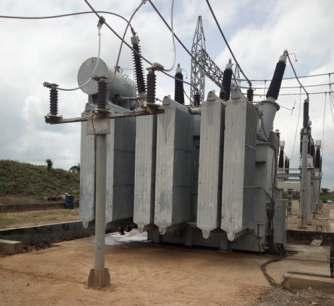
thOn the 19 July, 2020, a brand new 30MVA 132/33kV power
transformer and its associated 132/33kV bays was commissioned at Iseyin Transmission Station, Oyo State.
This increased the wheeling capacity of the substation from 40MVA to 70MVA and consequently the quantum of power available for Ibadan Electricity Distribution Company (IBEDC) to take to its customers in Oyo State and environs.
The transformer installation project was initially contracted out st on the 31 of May, 2013, taken over and completed in-house by TCN engineers.
The installed capacities and locations of the transformers are listed in the table below TCN is diligently implementing the rehabilitation and expansion of the nation's grid with the goal of ensuring a very robust and efficient transmission network The Company is determined to ensure that all on-going transmission projects across the country under its Transmission Rehabilitation and Expansion Programme (TREP) are completed on time
1. OGBA 2x60MVA 1x45MVA 100MVA 132/33kV
2. ASABA 1x150MVA 2x60MVA 300MVA 330/132kV
3. ETSAKO 1x40MVA 40MVA 132/33kV mobile transformer
4. AJAH 3x150MVA 2x60MVA 1x100MVA
60MVA 132/33kV
5. APAPA 2x45MVA 45MVA 132/33kV
IKEJA DISCO 80MW
BEDC DISCO 240MW
BEDC DISCO 32MW
EKO DISCO 48MW
EKO DISCO 36MW
6. GUSAU 60MVA 132/33kV KAEDCO DISCO 48MW
7. EGBIN 2x150MVA 330/132/33kV 30MVA 132/33 kV IKEJA DISCO 36MW
8. ILUPEJU 45MVA 132/33kV IKEJA DISCO 36MW
9. ISEYIN 40MVA 132/33kV IBADAN DISCO 36MW
C132/33kV transformer in Bichi Local Government Area of Kano State has commenced. This was made known by the Ag Managing Director/CEO of the Transmission Company of thNigeria (TCN), Engr. Sule Abdulaziz, on Friday, 10 July 2020 when he paid a courtesy visit to the Executive Governor of Kano State, Alh. Umar Ganduje.
ivil works for the installation of a brand new 40MVA
member representing Bichi Federal Constituency, Mr Abubakar Kabir, for bearing the entire cost of the civil works involved in the project as well as shouldering the responsibility of providing for the people handling the project
The Executive Governor while welcoming the Ag Managing Director, commended the Federal Government for the installation of the transmission sub-station in Bichi, adding that it would trigger a post Covid -19 economic recovery for the state.
The Managing Director revealed that he was in Kano to monitor ongoing work at the project site, and assured that as soon as ground work is completed, the installation of the transformer will be done within three months. The transformer would be installed under the 132Kv Kano/ Kankia/Katsina Line 1 at Bichi Local Government Area
Engr. Abdulaziz said the installation of the transformer would boost electricity in seven Local Government Areas of Kano State.
He explained that the project was facilitated by the state governor, who has demonstrated a huge level of commitment to address persistent power outage in Bichi. He also thanked the
He said the effort of President Muhammadu Buhari and the Honourable Minister of Power, Engr Sale Mamman, to assist the state to revive its economy, especially in the aftermath of the challenges of the Covid -19 pandemic was highly appreciated.
Governor Ganduje said the project will boost socio-economic activities in Bichi and seven other Local Government Areas within the vicinity of Bichi Local Government Area
He added that the installation of the transformer was a big development and assured that his government would take necessary steps to protect the transformer from acts of vandalism.
TTransmission Company of Nigeria (TCN), is presently undertaking various processes that would enable the effective implementation of World Bank funded transmission projects around the country
he Project Implementation Unit (PIU) under the
eligible competent contractors that will eventually execute these projects”.
The Project Manager for World Bank projects in TCN, Engr Dahiru Isiaku, who made this known during an interview in his office in Abuja said “ our responsibility is to provide project contract management for those identified transmission projects. We have a project portfolio of about $486m which is part of the $1.661b donor fund available for TCN projects. The World Bank project includes 3 key transmission projects”
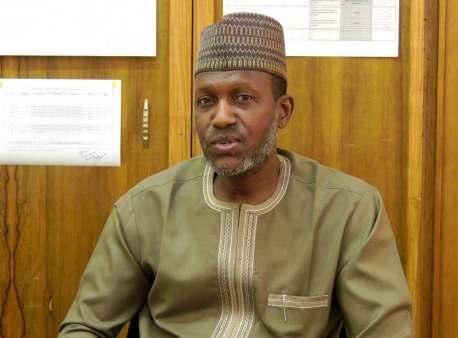
According to him, projects funded by the World Bank under PIU include; rehabilitation & reconstruction of transmission substations, reconductoring of transmission lines, and provision of Supervisory Control and Data Acquisition (SCADA).
He explained that the PIU has different credit facilities negotiated by the Federal Government One ended in December 2018 while the existing one, the Nigerian Electricity Transmission Access Project (NETAP), became effective in June 2019. The PIU, he said, operates under strict guidelines. “Once projects are articulated and agreed by TCN and the World Bank, the next step is to ensure procurement of our engineering consultancy services and
According to him, these processes start from expression of interest for engineering services for consultants, pre qualification of contractors who will be eligible to carry out these contracts, then request for bid from the qualified contractors that have been pre-qualified. The pre-qualified contractors now collect tender documents, complete them and submit The submission, he noted, include both technical and financial bid for evaluation according to World Bank guidelines. The submissions are then reviewed by the tender board and the lowest evaluated responsive bidder awarded the contract for implementation.
Engr Dahiru further stated that the management of TCN is focused on having a functional SCADA system for effective and efficient monitoring of the grid system which the World Bank is funding TCN management, he said, is also extensively training personnel that would be part of the project implementation of the SCADA system.
Engr Dahiru noted that the World Bank projects under the Nigerian Electricity Transmission Access Project (NETAP) are brown field which has to do with rehabilitating and reinforcement of power equipment in existing transmission substations and lines across the country. He added that the completion of these projects will increase the wheeling capacity of TCN to about 8,731MW, with additional 1.422km of transmission line projects.
Projects Manager, (TCN World Bank Projects) Engr. Dahiru Isiaku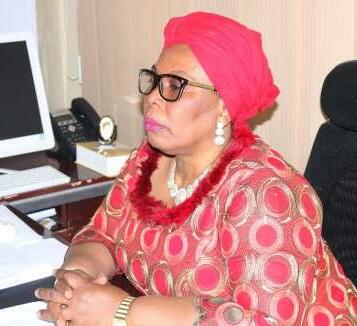
The Project Implementation Unit (PIU) of the Transmission Company of Nigeria (TCN) carried out joint inspection of the sites for construction of the new 2x150MVA, 3x60MVA, 330/132/33kV Transmission Substation at New Apo (Pigba), and the new 2x60MVA, 132/33kV Transmission Substation, Wumba Lokogoma in conjunction with the Project Consultant and representatives of the Donor Agency AFD (Agence Francaise de Developpement), on Friday, 21st February 2020 in Abuja The project when completed will increase bulk power delivery to FCT In this interview, the Project Manager for AFD funded projects in TCN, Engr. Mrs. Jane Okemini, speaks on the level of project execution, expected impact of the project and other issues with the TCN Transmission News. Excerpts:
Question: What is Abuja feeding Scheme all about?
Abuja feeding scheme is a project financed by the French Development Agency and is entirely a Green Field Project that will construct five new substations in Abuja and bring new supply route to Abuja through Lafia in Nasarawa State, bringing to three the 330kV supply routes to Abuja, viz; Ajaokuta, Shiroro and Lafia The new substations to be built in Abuja are 330kV substations in Apo and Lugbe and 132kV Substations in Lokogoma, Gwarinpa and Kuje.
Question: Can you tell us the stage of implementation of the Abuja Feeding Scheme?
We have completed the initiation, which is basically what we call the project identification processes and planning which involves all the studies that are carried out majorly the Environmental and social safeguards which includes:
i. ESMP-Environment and Social Management Plan
ii. ESIA- Environment and Social Impact Assessment
iii. RAP- Resettlement Action Plan.
We are presently on project execution, Monitoring/supervision.
Question: What is the impact of this project on the expansion of transmission network within Abuja?
The project will add 5 number of transmission substations which include 2 number 330/132/33kV substations, 3 number 132/33kV substations, 143KM of 330kV transmission lines
respectively This will also increase the network capacity, flexibility, and service delivery to Abuja Disco
Question: What are the major steps involved in this project implementation?
In summary the processes are as follows;
i. Engineering: Route/Topographical surveys, geotechnical investigation, site clearing and Engineering designs.
ii. P ro c u re m e n t : P l a c i n g o f e q u i p m e n t o rd e r s , manufacturing of the equipment in line with the approved designs, factory acceptance test, shipping, custom clearing, Haulage and receipt at the various sites.
iii. Construction: This includes the electromechanical and civil works (Erection/installation). When all these activities have been completed, then testing and commissioning of the project will be carried out after the project is closed.
Question: What are the challenges that you have experienced in this project and how did you mitigate them?
The major challenging factors so far have been the occasional environmental and social challenge that arise with potential delay to the project. We deal with the challenges as they arise on their merit. In some cases, we revert to the existing agreement/processes to adequately resolve the concerns of affected communities or persons.
Question: As the manager, what motivates you?
My primary motivation is the commitment and support of MD/CEO TCN and the management team for the successful delivery of the project Also the fact that this project will positively impact the socio-economic lives of the inhabitants of Abuja and its environs and by extension, Nigeria at large. This is certainly a thing of joy to me.
Project Manager, (AFD), Engr. Jane Okemini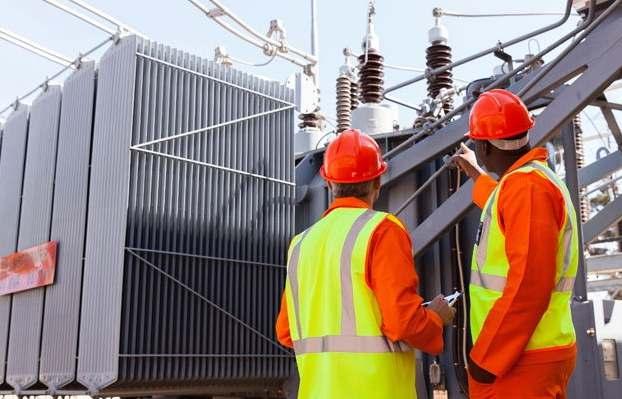

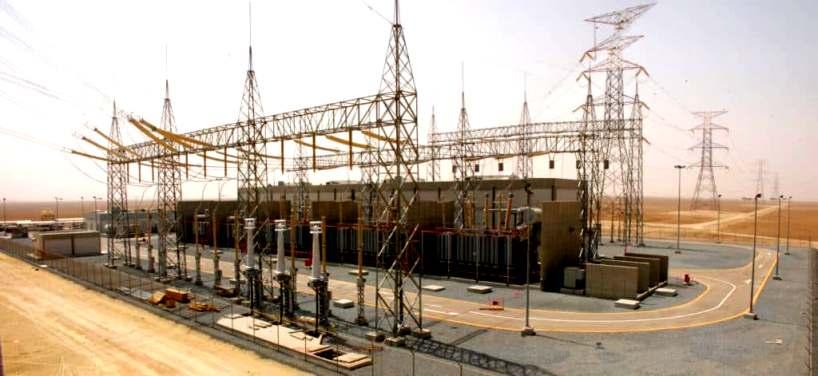 By Engr. Ismail Inuwa Dalhatu
By Engr. Ismail Inuwa Dalhatu
Earthing or grounding practices adapted at transmission substations and lines are of great importance. It is however observed that this item is most often neglected. They are skipped, considering them as too elementary or even unimportant. Indeed, they are important to every practicing engineer in charge of substations. Earthing system must be well designed, maintained and future expansion must be taken into account while designing the dimension of earth mat
The purpose of earthing are:
1. Protection to personnel
2. Protection to the plant and 3.Improvement in service quality and reliability
Non current carrying parts with conducting surface such as tanks of Power Transformers, and frame work of circuit breakers, structural steel works in switch yard instrument transformer cases, lightning arresters and armoured cables armouring should be effectively grounded for protection of equipments
and operating personnel Ear th connections of all equipments should be made in duplicate.
Connecting lead should have sufficient current carrying capacity. Lightning arresters should have independent earth electrode which should be inter connected to the station grounding system. All paints, enamel, seals should be removed from the point of contact of metal surfaces before earth connections are made The resistances of earth system should not exceed 1 ohms for 330/132kV Sub Stations Suitable grounding mat should be provided in the substation.
* The neutral point of the systems of different voltages which have to be earthed.
* Apparatus, frame work and other noncurrent carrying metal work associated w i t h t h e s y s t e m , f o r e x a m p l e transformer tanks, switch gear frame work etc
* Extraneous metal frame work not
associated with the power systems, for example, boundary, fence, steel structures etc
Earthing or grounding means an electrical connection to the general mass of earth to provide safe passage to fault current to enable it to operate protective devices and provide safety to personnel and Equipments.
* The earthing system must provide an environment which is free from the possibility of fatal electric shock
* The earthing system must provide a low impedance path for fault and earth leakage currents to pass to earth.
* The earthing conductors must possess sufficient thermal capacity to pass the highest fault current for the required time and must be able to dissipate high fault current repeatedly
* The earthing conductors must have sufficient mechanical strength
and corrosion resistance.
It is a connection to the ground of a part of the plant forming part of the operating circuits for example the star point of the transformer or the neutral conductor The grounding of the lightning arresters also comes under system grounding The provision of system grounding reduces to considerable extent the magnitude of the transient over voltages and there by increases the life of electrical equipment b e s i d e s m i n i m i z i n g t h e s e r v i c e s interruptions.
Thus the fundamental purpose of system grounding is the protection of installation and improvement in quality of service. The system grounding will also ensure the safety of personnel to some extent, as it helps to clear the fault within the shortest period of time.
It is a connection to the ground of noncurrent carrying parts of the equipments like Motors, Transformer Tanks, Switchgear enclosures, Metallic enclosures of all electrically operated equipment's and also the installations used to carry/ Support electrical equipments. The frames of the equipments, if not earthed, when it comes into contact accidentally with live part, will have potential with reference to the ground. The potential difference, when shunted between the hands and the feet of a person touching the frame, produces current through the body which can result in a fatality By connecting the frames to a low resistance ground system, a sufficiently high current will flow into the ground when accidentally the live parts of the equipment / Machiner y touch the frames , and
consequently saves the operating personnel from fatal accidents Thus the equipment grounding is basically intended to safeguard to a great extent from the hazards of touch voltages. The safety ground is so designed that the potential difference appearing between the frames and the neighbouring ground is kept within safe limits.
During ground fault conditions, the fault current flows via the system ground. When the system and safety grounds are inter connected, the fault current flowing (via) the system ground rises the potential of the safety ground. Also the flow of current to safety ground results in hazardous potential gradient in and around the substation. In view of the above it is sometimes suggested that separate system and safety grounds will avoid the danger arising due to potential gradients. The idea is that by connecting the system ground to a separate earthing system situated in an accessible spot, the ground fault current does not flow through the safety ground. However, this separate system of grounds has many disadvantages and can be more hazardous as mentioned below:
transformer has to be connected to this remote earthing by means of insulated leads Even with this arrangement one cannot always be sure about the complete isolation of the two systems and there is always a chance of inadequate electrical connection through buried neutral pipes etc Hence, this is impracticable, complicated and costly It is therefore a common practice to install a common grounding system and design the same for effective earthing and safer potential gradients.
System earthing is governed by provisions of Rule – Of I.E Rules, 1956. Unearthed systems have been tried and due to the phenomenon of Arcing Grounds associated with them, theses have been abandoned, except in some few cases of power station auxiliaries supply systems where other arrangements are made for indicating earth faults In an ungrounded system the insulation of all the equipment's, lines etc will have to be of much higher values as compared to those of equipments and lines of a grounded system. This aspect greatly reduces the costs and ensures more safety.
With separate grounds we can avoid danger due to potentials only for faults outside the stations.
Ÿ
Ÿ Short circuit currents will be more if the fault occurs in the substation.

Ÿ
The resistance may be more and in some cases sufficient currents may not flow to operate the relays.
Ÿ For effective separation of the earthing systems, the system ground shall be installed at a distance of at least twice the diagonal length of the substation which is covered by safety grounding T he neutral of the
Earthing through a resistance. Earthing through a reactance. Earthing through a Peterson coil Earthing directly or solid earthing
Because of the difficulties and disadvantages involved in marinating the system grounding and safety grounding separately, it is the common practice now to have a combined grounding system at the

4 The outer most peripheral earthing conductor surrounding the earth mat shall be of 100 x 16 mm size MS flat
5. The intermediate earthing conductors forming the earth mat shall be of 75 x 8 mm size flat.
6. All the risers used for connecting the equipment steel structures etc., to earth mat shall be of 50 x6 mm size except earthing of lightning arresters and transformer neutrals for which 100 x 16 mm or 75 x 8 mm size shall be used.
7. All Junctions (crossing of the steel flats while forming the earth mat and up risers from the earth mat for giving earth connections to equipments, steel structural conduits, cable sheaths shall be properly welded.
8. Proper earthing lugs shall be used for connecting the ear th terminals of equipments to the earthing steel flat
9. Provisions shall be made for thermal expansion of the steel flats by giving suitable bends.
10. The earth mat shall be formed by placing 75 x8mm MS flat at a distance 5 meters along the length & breadth of the substation duly welding at crossings.
11. All the equipments, steel structures, conduits, cable sheaths shall be solidly grounded by connecting to the earthing mat at least two places for each.
12. The ground mat of the switchyard shall be properly connected to the earth mat of the control room at least at two points.
13. Welding shall be given a coat of black
asphaltic varnish and then covered with hessian tape to avoid rusting
laid with constructional conveniences, keeping in view the above points.
1 4 A l l p a i n t s , enamel and scale shall be removed f r o m p o i n t o f contact in metal sur faces be fore ground connections.
15. The risers taken along the main switchyard structures and equipment structures (up to their top) shall be clamped to the structure at an interval of not more than one meter with ground connectors.
16. 75 X 8 mm ground conductor shall run in cable trenches and shall be connected to the ground mat at an interval of 5 meters.
17. Grounding electrodes 2.75 mtrs length 100 mm dia 9 mm thickness CI Pipes shall be provided at all the peripheral corners of the earthing mat and also at distance of 10 mtrs along the length & width of switch gear in the entire switch yard.
18. The grounding electrodes shall be derived into the ground and their tops shall be welded to a clamp and the clamp together with the grounding shall be welded to the ground conductor 19. The switchyard surface area shall be covered with a layer of crushed rock of size 25 x 40 mm to a depth of 100mm
20. Transformers, lightning arresters and single phase potential transformer shall be provided with earth pits near them for earthing and these earth pits in turn shall be connected to the earth mat
21. Power Transformers neutral shall be provided with double earthing Neutral earthing and body earthing of power transformers shall be connected to separate earth electrode.
22. The entire earthing system shall be
Earth electrodes shall be of CI pipe 100mm (inner dia) 2.75 meters long with a flange at the top and earth flat already indicated and shall be connected to earth grid in the Substation All earth pits are excavated and the preferred backfill is a mixture of coke and salt in alternate layers. A suitable size cement collar may be provided to each earth electrode All bolted earth mat connections and strip connections to the plant and equipment panel will be s u b j e c t e d t o s t r i c t s c r u t i ny Transformer Neutrals shall be connected directly to the earth electrode by two independent MS strips of 75 X 8mm. The transformer body earthing shall be done with 75 X 8 m m f l a t . T h e i n d e p e n d e n t connections of MS strips with earth mat shall be given on either side of the Transformer. All contact surface must be filled or ground flat to ensure good electrical connections, and the contact surface shall be protected with a contact lubricant Following this, all connections shall be painted with heavy coats of bituminous black paint so as to exclude moisture.
Ÿ
Neutral connection earth pipe shall never be used for the equipment earthing.
Ÿ
A separate earth electrode shall be provided adjacent to the structures supporting lightning arresters. Earth connection shall be as short and as straight as practicable. For arresters mounted near transformers, earth conductors shall be connected directly to the tank
Ÿ
An Earthing pad shall be provided under each operating handle of the isolator and operating mechanism of the circuit breakers. Operating handle of the isolator and supporting structures shall be bonded together by a flexible connection and connected to the earthing grid.
Ÿ
All equipment and switchgear etc., erected shall be earthed as per I.E Rules 1956.
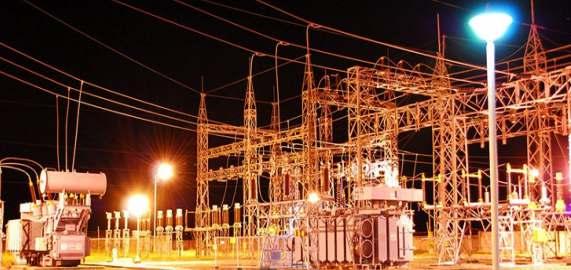 By Engr. Emeka Chiatula
By Engr. Emeka Chiatula
he pandemic outbreak, known as Coronavirus (COVID-
T19) started in December 2019 in Wuhan, China and has since spread around the world. This pandemic outbreak got to Nigeria with an index case in Lagos on 27th February 2020. The pandemic has impacted the entire energy value chain from drop in price of oil and gas, shift in electricity demand requirement, to force majeure for ongoing projects.
In the bid for the Nigerian government to contain the spread of the virus, the government, like others in affected countries, issued a stay at home order for an initial duration of two weeks in Abuja, Lagos and Ogun States, except for essential service providers around the country Many of the working population worked from home, and still do, even with the gradual easing of the lockdown. For the electricity sector, the electricity demand curve for customer classes such as residential, commercial, and industrial as well as the streetlights have expectedly taken a new shape.
Government's order for movement restriction limited commercial and industrial activities to the minimum consequently reducing their consumption while residential and streetlights increased, changing the consumption pattern of energy curve. Although residential electricity customers are more in number than other classes of energy consumers, their total electricity consumption will generate less revenue due to the low energy per capita per person and usage of energy efficient household appliances.
Even though residential customers have the largest population, they also have one of the lowest tariffs in the MYTO allocation of N24.3/KWh as compared to that of commercial and industrial consumption. Records from the daily load demand broadcast shows that on February 11, 2020, the peak demand was
4800MW and in April 6, 2020, 4731MW. This indicates that though there is a shift in consumption pattern tilting significantly to residential customers with the same total load off take, the revenue results would be different. This is because the class of customers consuming electricity are of the lowest in MYTO tariff allocation; there will therefore be a reduction in the revenue collections for the same quantum of energy at this time.
TCN has been constructing and investing in transmission infrastructure on massive scale to bridge every gap on the interface points between transmission and distribution systems. The execution of power projects in TCN is guided by Project Implementation Units (PIUs). The implementation process is in four phases: Feasibility, Bidding, Construction and Commissioning Phases. Most of TCN's ongoing projects are more of green field projects. For these projects, the bidding and construction phase will mostly be affected by the outbreak of COVID-19. This is because the stay at home order will restrict movement of contractors and other activities. The feasibility phase will also be affected as this is tied to the movement of foreign contractors/expatriates into Nigeria, and these will extend timelines of the projects.
With the global nature of the pandemic, some of the projects may initiate the force majeure clauses due to affected timelines on the project life cycles, necessitating new timelines which will be dictated by the recovery of the world from COVID-19. Presently, the Federal and state governments are intervening in various ways through palliatives; the intervention must be extended to the power sector especially in the payment for gas to ensure quality and consistent supply to the citizenry during this pandemic. Who knows, this may have to include payment for electricity if the recent clamour is anything to go by.
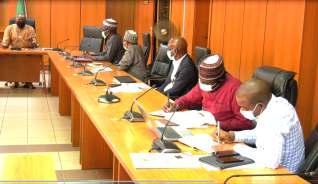
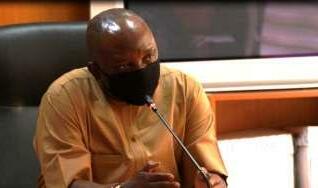
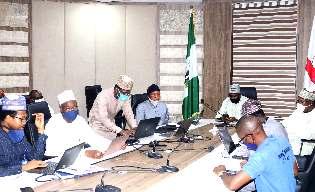
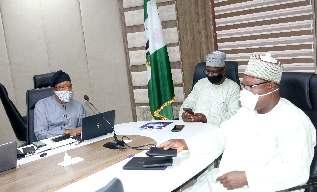
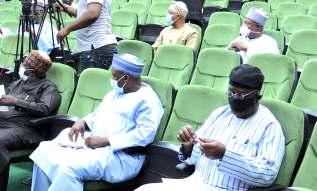
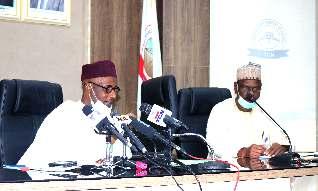
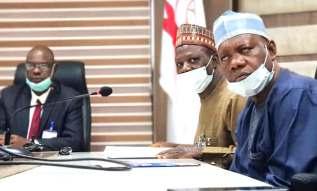
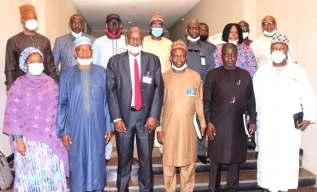 Acting MD/CEO, TCN, General Manager Nasarawa State Electric Power Agency ( NAEPA), Engr. Abubakar Danjuma Ango, some officials of the state and TCN Management, after the meeting on transmission projects in Nasarrawa state.
Acting MD/CEO, TCN, General Manager Nasarawa State Electric Power Agency ( NAEPA), Engr. Abubakar Danjuma Ango, some officials of the state and TCN Management, after the meeting on transmission projects in Nasarrawa state.
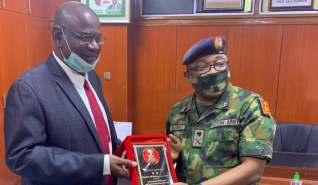
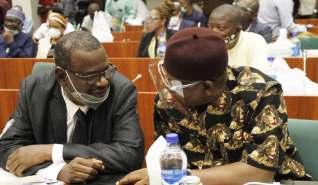
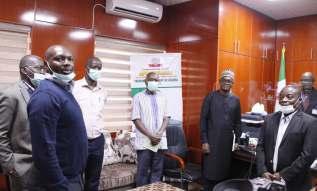
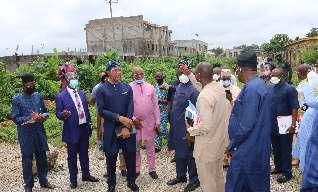
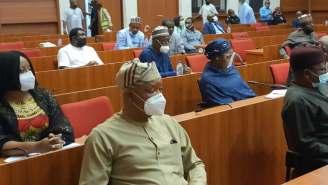
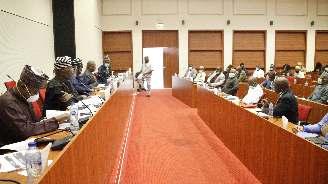
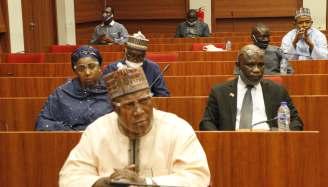
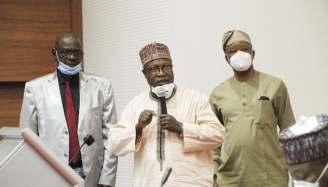

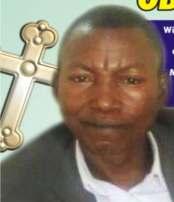
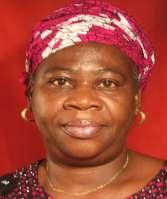
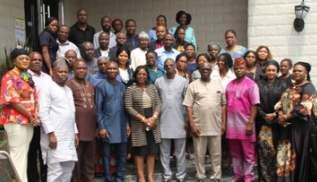
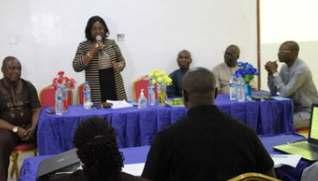

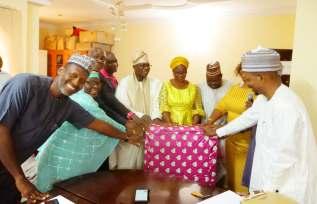
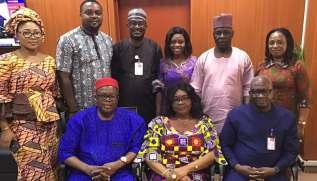
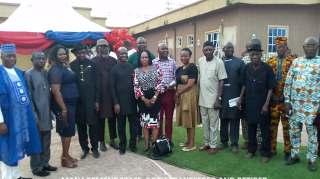
Those special memories of you will always bring a smile if only we could have you back, just for a little while The fact that you are no longer here will always cause us pain but you are forever in our heart Adieu!!!(Middle) Mrs Orji, SM (Secretary) HR during her retirement ceremony Middle), Engr TU J. Emuchay, RTM (Enugu) during his retirement ceremony Mrs Jennifer Okechukwu Okafor, daughter of Mrs Ubah, SM (ICT) ISO, and her husband (Middle), Mr Toki Adebisi Olufemi Olayiwola, PM (F&A)PMU, during his retirement ceremony Officer 1 Kaduna Region
he Transmission Rehabilitation and Expansion
TProgramme (TREP), is a 4-year plan by TCN to systematically guide its expansion of the nation's grid. TREP is a part of TCN's 20-year least cost transmission expansion plan which aims at increasing transmission capacity to 20,000MW in 2023.
No doubt there are challenges in executing the projects especially for the transmission lines, ranging from vandalism, to issues of Right of Way (RoW).
Given the difficulties of securing RoW for the network expansion, TCN, under the current management commenced collaborations with the State Governments to facilitate the acquisition of RoW for transmission and substation projects. Some of the collaborations are for specific investment projects.
In this regard, TCN has collaborated with Enugu, Edo, Kaduna, Ogun, Lagos, Kano, Abia, Ondo, Kebbi, Katsina, Yobe, Borno and Ekiti State Governments. The collaboration basically is for the State Governments to provide the RoW for the projects while TCN provides all equipment and equally carry out the electromechanical works.
TCN is also working with several State Governments on substations construction. The states include Bauchi, AkwaIbom, Kebbi and Delta States among others.
The company entered into collaboration with some states on specific projects; these include Ekim Substation with Akwa Ibom State, Abakaliki – Amosan line with Ebonyi State, 132kV transmission line and substation with Kano, Jigawa and Bauchi States and with Lagos State on connecting the Eko Atlantic City to the National grid.
Some of the MoUs signed in the last years are; - MoU with Akwa Ibom State on the 27th July, 2018 for the construction of Ekim 2x60MVA 132/33kV substation project
- MoU with Bauchi State on the 8th October, 2018 for the construction of Alkaleri 2x60MVA, 132/33kV substation project
- MoU with Bauchi State on the 8th October, 2018 for the construction of Toro 2x60MVA, 132/33kV substation project
- MoU with Bauchi State on the 18th October 2018 for the construction of Jama'are 2x60MVA 132/33kV substation project
- MoU with Ebonyi State on the 1st July 2019 for the construction of Umuogghara 2x60MVA, 132/33kV substation project
- MoU with Anambra State on 23rd August 2019 for the construction of 13kV 40Km TRX line Onitsha – Oba – Nnewi and 132kV line, Onitsha – Nibo – Agu – Awka – Oji River 132kV TRX line (The TRX line projects phase 1). The Construction of 132kV TRX line (Awka/Anambra – Aguleri, 132kV line (Amansea/Awka – Ekwulobia/Umuchu (Phase 2).
- MoU with Jigawa and Bauchi States on 5th February 2020 for the construction of 132kV DC TRX line (Azare – Misau –Gwaram – Birnin Kudu – Dutse) with turn in and turn out from Gwaram to Ningi and Substations at Birnin Kudu, Misau, Gwaram and Ningi.
- MoU with Jigawa, Kastina and Kano states on 13th February 2020 for the construction of 132kV DC TRX line (Daura – Kazaure – Danbatta – Babura) and 2x 60 MVA, 132/33kV Substations at Kazaure and Babura, 2x60MVA 132/33kV Substation at Mashi with turn in and turn out from Katsina – Daura 132kV Transmission line at Mashi.
The first phase of the Ekim Substation projects has been commissioned. Others are at various stages of execution and TCN will ensure that they are all completed and commissioned within the allotted timelines.
- MoU with the government of Kano State on the construction of a 132kV double circuit transmission line from Daura to Babura through Kazaure and Danbatta, a 2x60MVA, 132/33kV substation each at Kazaure and Babura and a 2x60MVA 132/33kV substation at Mashi with turn-in and turnout on Katsina -Daura 132kV line at Mashi.
he management of Transmission Company of Nigeria
T(TCN), organized a one day enlightenment lecture to sensitise staff on the outbreak of coronavirus around the world and what they need to do to keep safe.
The Assistant General Manager (Medical) Dr Mrs Edet Ademiluyi in her presentation urged staff to ensure adequate precautions and good hygiene as part of measures to protect themselves against the outbreak of the virus also known as COVID-19.
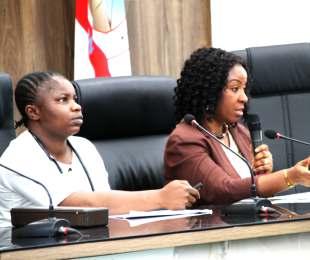
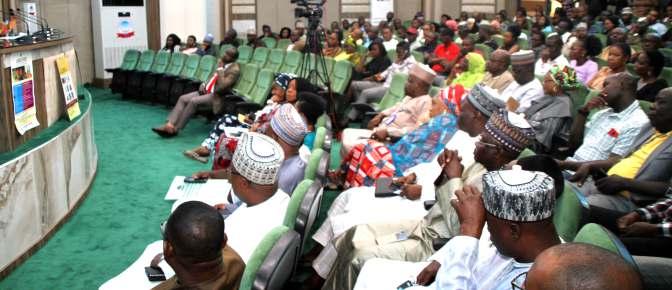
She stated that though the global community is still learning more about COVID-19, there was need for staff to pay attention to the symptoms of the disease; “Fever, cough, runny nose, sore throat and trouble breathing are some of the most common symptoms of the novel coronavirus” she said.
Dr Ademiluyi mentioned prevention of the virus to include; personal hygiene, respiratory hygiene, environmental hygiene, social distancing and boosting immune system.
She appealed to staff to wash their hands often with soap and running water for at least 20 seconds, use an alcohol-based hand sanitizer with at least 60 percent alcohol if water and soap are not available, and avoid close contact with people who are sick, take some time to rest and avoid touching their eyes, nose and mouth.
“Cover your cough or sneeze with a tissue, then throw the tissue in the trash, and wash your hands. Clean and disinfect frequently touched objects and surfaces and stay home if you are sick ” she said.
The Executive Director TSP lauded the initiative by the Medical Services team in sensitizing the staff on the outbreak of the virus which he described as real. He noted, “one way we all can fight the virus is by eating healthy and being physically fit”.
He used the occasion to appeal to staff not to abuse the use of hand sanitizer as anyone caught in the act will be sanctioned.
(LR:)NurseElizabethJoseph,AGM(Medicals),Dr.MrsEdetAdemiluyiemand:
D The amount of electricity being consumed at any given moment by a single customer, or by a group of customers. The total demand on a given system is the sum of all of the individual demands on that system occurring at the same moment. The peak demand is the highest demand occurring within a given span of time, usually a season or a year The peak demand that a transmission or distribution system must carr y sets the minimum requirement for its capacity (see also the definition for energy).
A set of measures utilized to reduce e n e r g y c o n s u m p t i o n . E n e r g y conservation is one kind of DSM.
Dispatch: As a verb: turning on or off, or setting the value or output of a generator, a capacitor bank, reactor or transformer setting. As a noun: the
state or status of these devices.
Distribution: Distribution lines and distribution substations operate at lower voltage than the transmission systems that feed them. They carry electricity from the transmission system to local customers When c o m p a r e d t o t r a n s m i s s i o n , distribution lines generally use shorter poles, have shorter wire spans between poles and are usually found alongside streets and roads, or buried beneath them. Typical distribution voltage in Nigeria are 33kV, 11kV and 0.415kV.
Distribution Utility: A utility in a franchise area that is responsible for owning, operating, and maintaining the distribution part of the electric system within an area
Fault: T he failure of a line, transformer, or other electrical

component Once such a component has failed (due to overheating, short circuiting, physical breakage, or other trauma) it is automatically taken out of operation by a circuit breaker that quickly turns the component off Once it has been “tripped off” it no longer poses a threat to human safety, but its loss may present a difficult burden to the remaining system.
Renewable power source: Any power source that does not run on a finite fuel which will eventually run out, such as coal, oil, or natural gas.
Renewable power sources include solar, wind and hydro generators, because sunlight, wind and running water will not run out Generators that burn replaceable fuels also commonly qualify as renewable power sources.
E x a m p l e s i n c l u d e b i o d i e s e l generators that run on crop-derived fuels and wood-burning generators.
The air inside a building can be up to 100 times dirtier than outside, and you're exposed to a variety of unhealthy gases and chemicals. There are pollutants in the air conditioning, as well as toxic particles, dangerous bacteria, and mold all lying around, especially in buildings that aren't well taken care of.
Photocopiers are a source of potentially deadly ozone if the filter isn't periodically changed, and it's possible that even very small amounts can cause chest pain and irritation. Laser printers do this, too, and they also release toner particles that can get in your lungs and blood stream, which could lead to lung disease and other ailments.
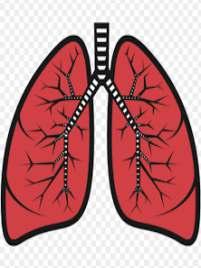
Ipower network, with the increase in the consumption of power capacity, a large amount of investment is directed into the transmission network in both power evacuation and generation. New power generator facilities are ongoing and proposed which will be connected to the transmission grid. Constructions of new transmission power lines are ongoing and proposed as well, to increase the power capacity, reliability and quality of the transmission line. In this proposal, high temperature/low sag conductors are proposed for reinforcement of the power transmission grid. The key issues associated with power evacuation on the Nigerian transmission grid for both 330kV and 132kV network will be highlighted, the proposed method will be explained and why it should be considered. A comparative type study will be done on the available types of conductors in construction/composition available to achieve this method. The financial impact of this proposed project, pros and cons of the method, areas on the national grid where this method is adopted as well as other developed countries, potential areas where this method is applied. Future work e.g studies to be carried out
n the bid to attain the 10,000MW target in the Nigeria
increasing the Total Transmission Capacity (TTC) of both the 330kV and 132kV network This will invariably increase the reliability, transferability and stability of the network
In this proposal, other alternatives of using advance conductor technologies are introduced. Typically, these new conductors replace the conventional ACSR and are operated at higher temperatures to increase the current rating. Advanced conductor materials and applications have increased current capacity, are lighter in weight, and provide the same sag as existing conductors. [209]
The choice of embracing the advance conductor technology is not to completely replace the construction of new transmission lines, but optimization. Some of the issues affecting the construction of new transmission lines are:
· Land saturation
· Duration of Project
· Funding · Environment Impact
With increase in demand of power has put in play the connections of new generators have triggered the need for additional transmission capacity This has become a worldwide problem to grid operators, especially in Nigeria which at the moment is faced with issues affecting the upgrade and reinforcement of the grid to attain the stated generation of 10,000MW As transmission lines are being built, there are parts of the country where there are electrical saturation of transmission lines especially overhead lines. The increase in the electrical power in an overhead line gives rise to the temperature, this in turn produces temperature; increment in conductor length and as a result increases sagging which sometimes exceeds the safety limits. As you can see from figure 1 below, this makes our traditional ACSR conductors to have an operational limit temperature of 80 C [209]
Upgrading strategies of overhead lines are sectioned into two methods for increasing the rating:

· Increase of ampacity
· Increase of voltage
There are different types of HTLS conductors available such as:
1) ACSS and ACSS/TW (Aluminium Conductor Steel Supported) Annealed aluminium strands over a conventional steel stranded core. Operation to 200°C
2) ZTACIR (Zirconium alloy Aluminium Conductor Invar steel Reinforced) High-temperature aluminium strands over a low thermal elongation steel core. Operation to 150ºC (TAI) and 210°C (ZTAl).
3) GTACSR (Gap Type heat resistant Aluminium alloy Conductor Steel Reinforced) High-Temperature aluminium, grease-filled gap between core/inner layer Operation to 150°C GZTACSR (Gap Type super heat resistant Aluminium alloy Conductor Steel Reinforced).
For the Transmission Company of Nigeria, the standard conductor is the Aluminum Conductor Steel Reinforced (ASCR);
·In 330kV network ACSR (BISON)
·In132kV network ACSR (Bear sometimes Wolf)
Normally, the first solution always put on the drawing board is to consider building new transmission lines; of course it is necessary in this stage of our transmission network because of the radial nature. At the moment new transmission lines, both ongoing construction and as well as proposed, is a method to
With this type of conductor, changes tend to occur in the mechanical properties with temperatures higher than 90ºC The temperature is a function of electrical current and the environmental conditions The maximum allowable temperature is about 75ºC This invariably reduces the amount of current that passes through the conductor
Conductor Information
Table: ACSR Conductor Data
Conductor Type ACSR
Voltage 330 kV
Stranding 54/7
Mass 1443 kg/km
Overall Diameter 27 mm
Rated tensile strength 120.9 kN
Ampacity per conductor 684 A
Operating Temperature 75 ºC
Ambient temperature 40 ºC
D C resistance at 20ºC 0.075 73 Ohms /km
The steel supported aluminium conductors (ACSS), is a sagresistant steel-cored conductor ACSS is mostly supported by its steel core. The steel core provides most of its tensile strength.
The behavior of ACSS is a composite of the steel core and annealed aluminum, though the aluminum carries little of the load, because of its low yield strength. The operating temperature of ACSS is not limited by the properties of aluminum, since the aluminum is already fully annealed. Instead, the temperature limitation comes from the properties of the steel core, which has an annealing temperature around 240 ( the surface temperature may be significantly cooler). This i s s i g n i f i c a n t l y h i g h e r t h a n A C S R o r A A A C [transloadingdesingCriteriaAndHTS].
Conductor Information
Table2: ACSS Conductor Information
Conductor Type ACSS
Voltage 330 kV Stranding 54/7 Mass 1443 kg/km
Overall Diameter 27 mm
Rated tensile strength 110.5 kN Ampacity per conductor 1,600 A
Operating Temperature 250 ºC
Ambient temperature 40 ºC D C resistance at 20ºC 0.0748(max) Ohms/km
The ACSS (Steel Supported Aluminum conductors) unlike the ACSR counterpart is almost supported by its steel core. The operating temperature of the ACSS is not really limited by the aluminum properties since the aluminum is already fully annealed. Instead, the temperature limitation comes from the properties of the steel core, which has an annealing temperature of around 250ºC This temperature is significantly higher than ACSR As stated above, the temperature is a function of electrical current which means greater amount of
current is passed through without weakening the cables.
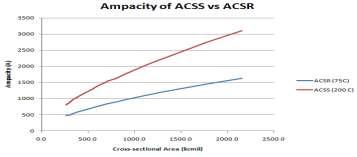
ACSS and some other high temperature conductors are normally built in a compressed manner where conductors are made up of trapezoidal type configuration wires which have a closer compactness than the normal ACSR conductors. The figure below shows the difference between the two types of cable.

The high-temperature sag behavior of ACSS is generally better than that of ACSR ACSS is among the cheapest hightemperature conductor technologies, with a bulk price 1.5-2x that of ACSR The compactness will lower the resistance per kilometer and thereby increase the ampacity of the cable (Kindly see data comparison below).
Conductor Type ACSR ACSS GAP
Voltage 330 330 kV
Stranding 54/7 54/7 Mass 1443 1443 kg/km
Overall Diameter 27 27 mm
Rated tensile strength 120.9 110.5 kN
Ampacity per conductor 700 1600 A Operating Temperature 75 250 ºC
Ambient temperature 40 40 ºC
D C resistance at 20ºC 0.07573 0.0748 Ohms/km
Re-conductoring is an efficient way of uprating the ampacity of a transmission system since the operation of such lines with the conventional ASCR conductors is limited by the thermal rating and, moreover, older voltage lines may have been constructed with towers that can support the desired weight of the conductors. Re-conductoring is not effective for stability since the inductance is not changed significantly by reconductoring
Operating temperatures up to 250 ºC, in contrast, ACSR is
typically limited to around 100 ºC The corresponding increase in the allowable temperature rise above ambient implies a corresponding increase in the ampacity for a given cross sectional area of a given conductor
The cost of these cables is higher than conventional cables. The cost difference between ACSR and the other conductors varies. ACSS, which is physically very similar to ACSR, has a cost of 1.52x that of ACSR. According to 3M, the cost of ACCR is 3-6x that of ACSR. The rest of the cable technologies appear to lie within that range of 1.5-6x. This is due to compactness of conductors using trapezoidal configuration which has large amount of aluminum in the cable. The high purity and special alloy are also more expensive than standard aluminum. Assuming the cost of material, additional costs includes engineering design, permitting, legal cost, construction costs) have added to the cost of initial installation. However, some of these costs may be expected to reduce in subsequent implementations.
In the comparative cost study, it will encompass checking /analyzing the cost evaluation of the Construction of a new (2nd ) line vs. Re-conductoring with existing assets
According to the analysis made by TCN planning and evaluation committee, which evaluated contracts awarded in 2008, the cost per kilometer, listed in the table below;
Table 4: (Average cost per km awarded by TCN in 2008)
330 kV DC line 0.0434
330kV SC line 0.0372
132kV DC line 0.0372
132 kV SC line 0.02325
760kV DC line 0.12
To attain reliability in the transmission network, it was a mandatory standard to make all new construction of transmission lines to be double circuit. For existing single circuit transmission lines, another line should be constructed not only for reliability but to achieve (N-1) criteria
Ibom Power generating station with a capacity of 441MW currently in operation is in urgent need for the exportation of its power generated. The transmission line currently exporting power out of Ibom is a 132kV single circuit (SC), the conductor used is a ACSR (Bear) conductor which has a operating close to its current capacity Distance: Eket – Uyo – Itu = 64km.
A solution was brought in to be able to evacuate the power generated by constructing new 132kV single circuit line (SC) but this has a lot of challenges such as; Right of Way issues and corridor space. Reconductoring was proposed to increase the capacity of power transfer and also reduction of the cost The next section shows the cost benefit analysis of using the reconductoring method to see if it was the better solution.
The cost for an additional 132kV single circuit line from EKET –UYO – ITU from the data in figure 4 below, we can see that the cost for building a 132kV single circuit is 150,000 USD/km. The cost of the new generation HTLS conductors according to 3M is 1.5 – 3x the original price of the conventional ACSR conductors. In this case with reference to the engineer's estimate prepared for Keffi – Kwoi - Kachia 132kV Double Circuit Transmission line:
Cost of ACSR conductor per kilometer = N641,483
N641,483=N1,924,449(Approximately)
3
Table 5: Cost Comparative table New Line vs. Re-conductoring
Project CONSTRUCTION OF NEW 132KV LINE RECONDUCTORING OF 132KV LINE
Cost Per N/km N23,250,000 (all inclusive) N1,924,449 (including replacing of clamps & service cost)
Distance(km) 64 64
Total Cost N1,488,000,000 N123,164,736
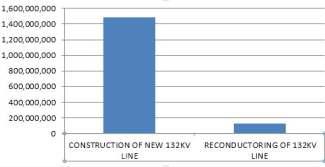
From the analysis conducted and research materials provided, it can be seen that the construction of a new line is this case is far more expensive in this case, making reconductoring with HTLS conductors;
Cost effective
Eliminates right of way issues
With the cost effectiveness of the project methodology it makes it a bit easier to be funded
Reduction of environmental impact
Different methods of increasing the rating of overhead line and the effects have been presented. The advanced conductor technologies are focused on the economic impact and analysis of using a HTLS conductors to replace the normal conductors (ACSR). In this paper, ACSS conductors were compared to ACSR both technically and economically The conclusion is that;
-- ACSS has higher current carrying capacity than the ACSR from the cable data compared
-- Re conductoring of HTLS conductors is more economical than construction of new transmission lines where procurement of HV assets and civil costs is avoided, right of way issues boycotted.
As seen in case 1, re-conductoring justifies the economic advantage proposed in this article.
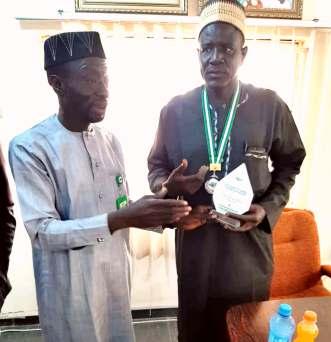
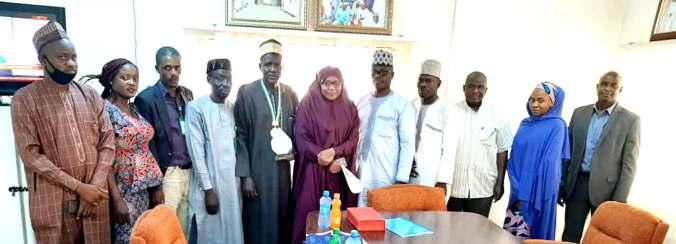 By Maimuna Isah-Ladan
Members of KYGG Group and TCN staff, Kaduna Region
(Right), the Regional Transmission Manager (RTM), Kaduna Region, Engr. Haruna Aminu, receiving the award on behalf of TCN
By Maimuna Isah-Ladan
Members of KYGG Group and TCN staff, Kaduna Region
(Right), the Regional Transmission Manager (RTM), Kaduna Region, Engr. Haruna Aminu, receiving the award on behalf of TCN
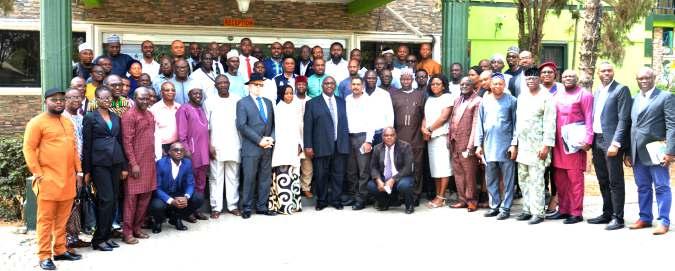 By Omideji Oluwakayode
By Omideji Oluwakayode
he General Manager (System Operation), of
TTransmission Company of Nigeria (TCN), Engr Mrs. Nafisat Ali, has appealed for attitudinal changes among stakeholders in the Nigeria electricity value chain in order to make the supply of electricity to Nigerians seamless.
Engr Nafisat made the appeal in her address during the Biannual joint Generation, Operation, Distribution Planning meeting hosted recently in Osogbo, the Osun State capital by the Independent System Operations (ISO), a subsector of TCN.
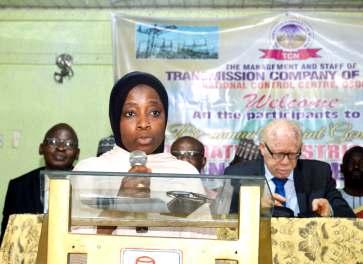
According to her, the meeting was put in place to address operational issues as they affect the supply of electricity in the country in order to evaluate and make recommendations that will move the sector forward.
She decried the attitude of some distribution companies (DisCos) towards the attendance of the meetings where far reaching decisions are taken for the interest of the sector According to her, “this is not an attack, it's an appeal to all of us, it's about our country. Last year, when this meeting took place in Benin City, only few Discos attended. We need an attitudinal
change. We need to keep communicating and discussing issues affecting our operations and take decisions that would improve the sector”, she said.
Engr Ali further appealed to the participants to be ready to implement decisions and recommendations reached at the end of the interface meeting for the needed change in the industry She noted that stakeholders must be committed to cater for electricity needs of customers, as increase in generation capacity without utilization, amounts to nothing. She urged stakeholders to wake up to their responsibilities and provide the needed power supply to Nigerians.
In his address, the General Manager, National Control Centre (NCC), Osogbo, Engr Kingsley Osuoha, appealed to participants not to make the meeting a talking platform, where decisions and recommendations reached are not implemented. According to him, the challenges in the sector are surmountable and that formed the basis for bringing together stakeholders in the nation's electricity value chain to tackle operational issues.
GM (System Operation), TCN, Engr. Mrs. Nafisat Ali addressing stakeholders at the meeting Participants at the meetingCommissioning of 300MVA, 330/132/33kV capacitypowertransformeratAsabaT/S
Commissioning of 100MVA,132/33kV power transformeratOgbaT/S
Commissioning of 60MVA,132/33kV power transformeratGusauT/S
Commissioning of 30MVA,132/33kV power transformeratEgbinT/S
ReplacementandcommissioningofT245MVA 132/33kVtransformeratIlupejuT/S
Installationof40MVAtransformeratIseyinT/S
Commissioning of 45MVA,132/33kV power transformeratApapaT/S
Commissioning of T1 60MVA, 132/33kV TransformeratAjaT/S
Replacementofvandalized
for 330kV B6N Benin/Egbin, Benin/Omotosho line
NewAbeokuta132kV
Ota/Papa 132kV
GridSystemFrequencywasdevelopedbyNCC andlaunchedforusebyRegionsGMs



18. Erection of Tower 29A and 29B on Gombe –Ashaka – Potiskum 132kV Line across a river wassuccessfullycompletedandenergized
19. Repairofburnt30MVA132/33kVtransformerat Kumbotso and Oworoshoki T/S was successfullycompletedandenergized

20. Replacement of HV bushing of earthing transformer on T1A 40MVA Transformer at Agu Awka T/S; T4 60MVA 132/33kV transformer at Funtua T/S; 500KVAGrounding Transformer (GT) on T1 60MVA 132/33kV transformeratIkoroduT/SandNiboT/S
21. Replacementof2No.cracked33kVBushings of300KVA33/0.415kVGrounding TransformerontheLVofT0160MVA 132/33kVtransformeratelelenwoT/Sand 330kVisolatoronthe75MVArReactorbayat ApirT/Swassuccessfullycompleted
spans) Suleja-Katampe132kV(DC)
of vandalized conductor
T265T267
T229-T231
22. Installationandcommissioningofnew33kV CircuitBreakerWukarifeederatYandevT/S andOwerriT/S;330kVCircuitBreaker CromptonGreavesonCB5bayatDeltaand GombeT/S;132kVGCBonKankia/Katsina lineatKankia,MarylandandAkureTS
23. Replacement of defective 132kV CB on Owerri/Ahoada 132kV Line 2 Bay at Owerri , CalabarandGombeT/S
24. Installation of transfer switchgear for auxiliary supply at Akure TS and new set of 110VDC Batterycellstoreplacethefaultybatterycellsat AhoadaT/Sand110Vdc(12Vx9Units)battery BankatBirninKebbiT/S
Engr. Godwin O. Osakue - 2005 Engr. Hussein S. Labo - 2008 Engr. Isa Musa - 2009 Engr. Akinwunmi Bada - 2010 Engr. Hussein S. Labo - 2010 Engr. Akinwunmi Bada - 2011 Engr. Olusola O. Akinniranye from April - 2012 Engr. Don Priestman - 2012
Mr. Mack Kast 2013 - 2015
Mr. Paul Stefinsin - 2015 Dipank Sarma (Acting) - 2015
Mr. Mark Kast 2015 - 2016 Engr. (Dr) Abubakar Atiku 2016 – 2017
Mr. Usman Gur Mohammed 2017 – 2020 Engr. Sule Abdulaziz 2020 to Date



COVID -19 is the infectious disease caused by the novel coronavirus. This new virus was unknown before the outbreak which began in Wuhan, China in December 2019. WHO has declared this outbreak a pandemic.

The human coronavirus are most commonly spread from an infected person to others through • droplets produced through coughing and sneezing
• Close personal contact such as touching and shaking hands These droplets land on objects and surfaces around the person, and people then contract the disease by touching these surfaces, then touching their mouth, nose or eyes before washing their hands.
Most common symptoms are fever, dry cough and difficulty in breathing
Others symptoms include – tiredness, aches and pain, catarrh, sore throat.
These symptoms are usually mild and begin gradually; some people become infected but don't develop any symptoms.
Most people, about 80%, recover from the disease without needing special treatment
About 16% become severely ill and develop difficulty breathing and need hospitalization.
The elderly, those with underlying medical problems such as high blood pressure, heart problems, and diabetes are more likely to develop serious illness. About 2% of people with the disease have died.
• Total number of cases – 16,735,542
By Dr. EdetAdemiluyi• Total number of deaths – 659,058
• Total number of recovered cases –10,297,777
It has now spread to 213 countries.
THE HIGHEST NUMBER OF CASES: USA, Brazil, India,Russia.
There are currently no vaccines available to protect you against human corona virus infection Transmission is reduced through:
• Washing your hands often with soap and water for at least 20 seconds or use alcohol based hand sanitizer
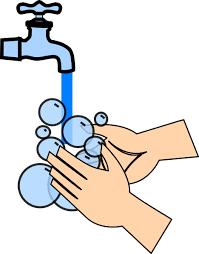
• Avoiding touching eyes, nose or mouth with unwashed hands.
• Avoiding close contact with people who are sick – stay at least 3 feet away.
• Practice hand hygiene, environmental hygiene (disinfect frequently touched surfaces around), social distancing and boosting immune system.
If you are mildly sick, keep yourself hydrated, stay at home and rest
If you are concerned about your symptoms, see your healthcare provider Cover your cough or sneeze with disposable tissue or the bend of your elbow, and avoid crowded places.
1. Relax – get enough rest and sleep and manage stress well.
2. Drink green tea
3. Get some gentle exercise regularly and maintain a healthy weight.
4. Eat a healthy plant based diet full of fruits and vegetables, nuts, seeds, probiotics.
5. Stop smoking and drinking alcohol excessively